大学英语自学教程(上册)词汇表音标
- 格式:doc
- 大小:215.00 KB
- 文档页数:42
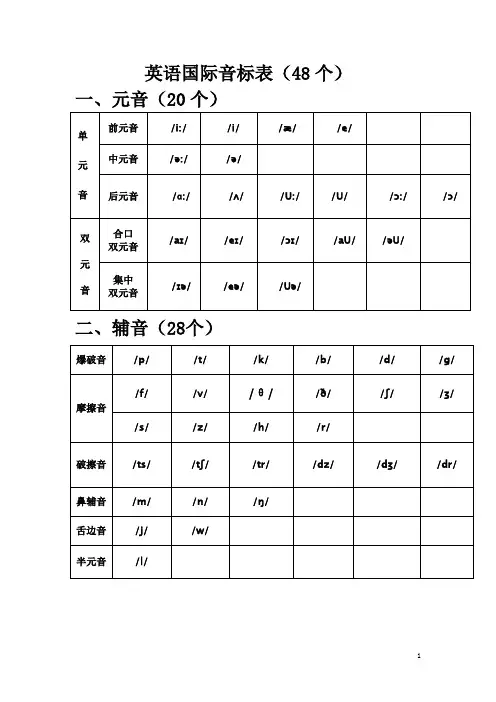
英语国际音标表(48个)一、元音(20个)二、辅音(28个)元音音标例词表/i:/例词:Chin e se t ea cher m e h e sh e s ee t ea k ey /ɪ/例词:l i sten g i ve i t b i g sh i p stud y/e/例词:t e ll th e n b e d g e t e nd l e t h ea d m a ny fri e nd l e sson/æ/ 例词:c a t a pple m a p c a p b a d a nd/ ʌ/ 例词:n u mber m o ther u nder b u t c u p t ou ch/ə/例词:b a nan a teach er a go pand a doct or a bout fam ou s/ ɜ:/例词:b ir d n ur se h er d ir ty ear ly w or ker/ɑ:/ 例词:ar m cl a ss c ar f a st d ar k st ar c ar dh ar d f ar m g ar den/ɒ/例词:d o g b o x wh a t h o t l o t c o ck b ough t/ɔ:/ 例词:m or ning w al k h or se w a ter sh or t d oor t al k s aw au tumn/ʊ/例词:b oo k f oo tball g oo d c oo k t oo k f u ll sh ou ld/u:/例词:s ou p f oo d z oo wh o r u ler fr u it c oo l/eɪ/例词:c a k e pl a n e a ge d ay th ey eigh t gr ea t d a te w ai t r a ce/aɪ/例词:b i k e r i c e r i c e h i m y b ye fl y h igh b uy l i ke l igh t/ɔɪ/ 例词:b oy p oi nt t oy oi l j oi n s oi l n oi se/əʊ/ 例词:n o s e b oa t n o ow n b ow l kn ow sh ou lder /aʊ/ 例词:h ou se fl ow er ou t n ow t ow n br ow n/ɪə/ 例词:ear d ear h ere id ea n ear/eə/ 例词:ch air p ear air h air b ear th ere th eirc are ful/ʊə/ 例词:s ure p oor t our辅音音标例词表/p/ 例词p encil a pp le p en p ig p ark ha pp y s p eak /b/ 例词b anana foot b all b ig b us jo b b ird b ike / t/ 例词t eam grea t t o t ea sea t boa t bo tt le/d/例词d og han d d o d own gla d ma d e win d ow / k/ 例词k ite musi c c ow c ar c ard c ome ba ck/g/ 例词g reen do g ba g e gg pi g g rass g irl g ive /f/ 例词f ish co ff ee f at f ace li f e ph one f ather /v/ 例词v isit lo v e o f v iew v ery v iolin lea v e/s/ 例词s un ri ce s ea s mell s ell s ame fa ce s nake mou s e/z/ 例词z oo no s e eye s knee s pri z e mu s ic/ð/ 例词th is mo th er th at th ese th ose/θ/例词bo th th ree th ing mou th th ank bir th day/ʃ/ 例词sh oe fi sh sh e s ure wa sh sh ip sh eep/ r/ 例词r ed r obot r un r ain r ace w r ite r ead/ h/ 例词h ouse h ead h e h en h ill h igh h air h orse /ts/例词ca ts coa ts pe ts shir ts ska tes studen ts /dz/ 例词be ds frien ds car ds han ds roa ds/tr/ 例词tr ain tr ousers tr ee tr ip/dr/例词dr iver dr ess dr op dr eam/tʃ/ 例词ch air mu ch wat ch ch ild Ch ina lun ch/dʒ/ 例词j ump bri dge j eep j oke oran ge/m/ 例词m um ju m p m y ho m e co m e so m e m outh ga m e m any/n/ 例词n ew fa n so n ru n thi n n eck n oo n k n ife n umber/ŋ/ 例词si ng swimm ing ki ng so ng thi ng stro ng bri ng/ ǀ/ 例词l ion ru l er l etter l esson l ion l amp ba llgir l ta ll bott l e/ w/ 例词w arm w indow wh at wh eel w ay w atch w ash/ j/ 例词y es y ard y ear y ellow/ʒ/ 例词plea s ure u s ually。
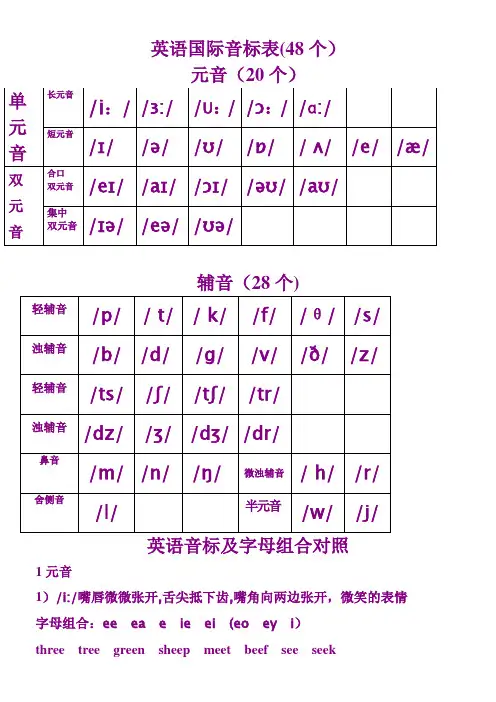
英语国际音标表(48个)元音(20个)辅音(28个)英语音标及字母组合对照1元音1)/i:/嘴唇微微张开,舌尖抵下齿,嘴角向两边张开,微笑的表情 字母组合:ee ea e ie ei (eo ey i )three tree greensheep meet beef see seektea meat leave lead teacher team mean speak clean please piece receive ceilinggreen形容词a。
1。
绿的;青葱的The hills are very green in spring. 春天山上一片葱绿。
2.(果实等)未熟的;嫩的Green tomatoes are sour。
未熟的番茄是酸的。
3.(脸色等)发青的She turned green when she came off the roller coaster。
当她从云霄飞车上下来时,脸色发青。
4。
无经验的;容易上当的He is a green hand.他是个新手.5。
妒忌的[F][(+with)]I am green with envy。
我羡慕极了.6。
(记忆)清晰的,栩栩如生的7.(常大写)属于(旨在保护环境的)绿色组织的[B]8.绿色(英镑)的(指欧洲共同体内部为计算农产品价格而规定的高汇率英镑)[B]9。
关心生态的;关心环保的I own only two of those new green cleaning products。
我只有两种新的环保清洁剂.名词n.1.绿色,青色[C][U]The room was decorated in bright green。
这房间以鲜艳的绿色装饰着.2。
草坪,公共草地[C]They are dancing on the village green。
他们正在村子里的草地上跳舞。
3。
蔬菜;植物[P][K]I had a dish of greens。
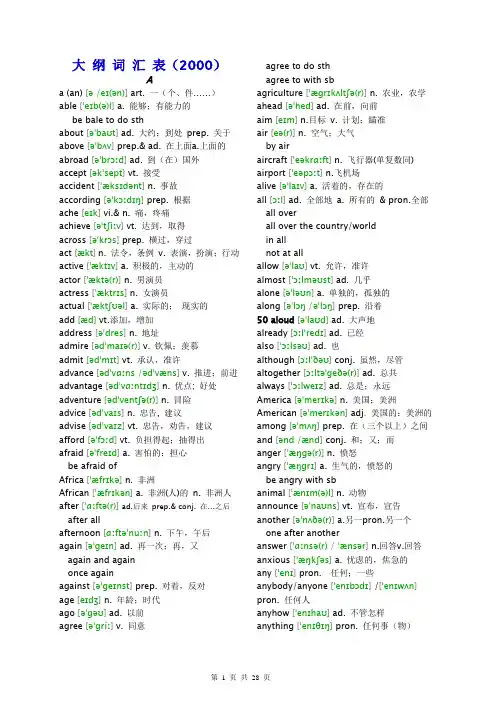
大纲词汇表(2000)Aa (an) [ə /eɪ(ən)] art. 一(个、件……)able [ˈeɪb(ə)l] a. 能够;有能力的be bale to do sthabout [əˈbaʊt] ad. 大约;到处prep. 关于above [əˈbʌv] prep.& ad. 在上面a.上面的abroad [əˈbrɔːd] ad. 到(在)国外accept [əkˈsept] vt. 接受accident [ˈæksɪdənt] n. 事故according [əˈkɔːdɪŋ] prep. 根据ache [eɪk] vi.& n. 痛,疼痛achieve [əˈtʃiːv] vt. 达到,取得across [əˈkrɔs] prep. 横过,穿过act [ækt] n. 法令,条例v. 表演,扮演;行动active [ˈæktɪv] a. 积极的,主动的actor [ˈæktə(r)] n. 男演员actress [ˈæktrɪs] n. 女演员actual [ˈæktʃʊəl] a. 实际的;现实的add [æd] vt.添加,增加address [əˈdres] n. 地址admire [ədˈmaɪə(r)] v. 钦佩;羡慕admit [ədˈmɪt] vt. 承认,准许advance [ədˈvɑːns /ədˈvæns] v. 推进;前进advantage [ədˈvɑːntɪdʒ] n. 优点; 好处adventure [ədˈventʃə(r)] n. 冒险advice [ədˈvaɪs] n. 忠告, 建议advise [ədˈvaɪz] vt. 忠告,劝告,建议afford [əˈfɔːd] vt. 负担得起;抽得出afraid [əˈfreɪd] a. 害怕的;担心be afraid ofAfrica [ˈæfrɪkə] n. 非洲African [ˈæfrɪkən] a. 非洲(人)的n. 非洲人after [ˈɑːftə(r)]ad.后来prep.& conj. 在…之后after allafternoon [ɑːftəˈnuːn] n. 下午,午后again [əˈɡeɪn] ad. 再一次;再,又again and againonce againagainst [əˈɡeɪnst] prep. 对着,反对age [eɪdʒ] n. 年龄;时代ago [əˈɡəʊ] ad. 以前agree [əˈɡriː] v. 同意agree to do sthagree to with sbagriculture [ˈæɡrɪkʌltʃə(r)] n. 农业,农学ahead [əˈhed] ad. 在前,向前aim [eɪm] n.目标v. 计划;瞄准air [eə(r)] n. 空气;大气by airaircraft [ˈeəkrɑːft] n. 飞行器(单复数同) airport [ˈeəpɔːt] n.飞机场alive [əˈlaɪv] a. 活着的,存在的all [ɔːl] ad. 全部地a. 所有的& pron.全部all overall over the country/worldin allnot at allallow [əˈlaʊ] vt. 允许,准许almost [ˈɔːlməʊst] ad. 几乎alone [əˈləʊn] a. 单独的,孤独的along [əˈlɔŋ /əˈlɔŋ] prep. 沿着50 aloud [əˈlaʊd] ad. 大声地already [ɔːlˈredɪ] ad. 已经also [ˈɔːlsəʊ] ad. 也although [ɔːlˈðəʊ] conj. 虽然,尽管altogether [ɔːltəˈɡeðə(r)] ad. 总共always [ˈɔːlweɪz] ad. 总是;永远America [əˈmerɪkə] n. 美国;美洲American [əˈmerɪkən] adj. 美国的;美洲的among [əˈmʌŋ] prep. 在(三个以上)之间and [ənd /ænd] conj. 和;又;而anger [ˈæŋɡə(r)] n. 愤怒angry [ˈæŋɡrɪ] a. 生气的,愤怒的be angry with sbanimal [ˈænɪm(ə)l] n. 动物announce [əˈnaʊns] vt. 宣布,宣告another [əˈnʌðə(r)] a.另一pron.另一个one after anotheranswer [ˈɑːnsə(r) / ˈænsər] n.回答v.回答anxious [ˈæŋkʃəs] a. 忧虑的,焦急的any [ˈenɪ] pron. 任何;一些anybody/anyone [ˈenɪbɔdɪ] /[ˈenɪwʌn] pron. 任何人anyhow [ˈenɪhaʊ] ad. 不管怎样anything [ˈenɪθɪŋ] pron. 任何事(物)anywhere [ˈenɪweə(r)] ad. 任何地方apologize [əˈpɔlədʒaɪz] vi. 道歉,谢罪appear [əˈpɪə(r)] vi. 出现apple [ˈæp(ə)l] n. 苹果April [ˈeɪprəl] n. 四月area [ˈeərɪə] n. 面积;地方,区域;领域argue [ˈɑːɡjuː]vi. 争辩,争论arm [ɑːm] n. 臂,支架v. 武装n. 武器take sth in one’s armsarmy [ˈɑːmɪ] n. 军队around [əˈraʊnd] prep.& ad. 在周围大约arrival [əˈraɪv(ə)l] n. 到来,到达arrive [əˈraɪv] vi. 到达;达到arrive at/in a placeart [ɑːt] n. 艺术,美术;技艺article [ˈɑːtɪk(ə)l] n.文章;东西,物品;冠词artist [ˈɑːtɪst] n.艺术家as [əz /æz] ad.& conj.和一样因为prep.作为ash [æʃ] n. 灰;灰末ashamed [əˈʃeɪmd] a. 惭愧;害臊Asia [ˈeɪʃə] n. 亚洲Asian [ˈeɪʃ(ə)n /ˈeɪʒ(ə)n] n.& a. 亚洲人(的) ask [ɑːsk/æsk] v. 问;要求;asleep [əˈsliːp] a. 睡着的assistant [əˈsɪst(ə)nt] n. 助手,助理astonish [əˈstɔnɪʃ] vt. 使惊讶at [æt] prep.在attack [əˈtæk] vt./n. 攻击,袭击attempt [əˈtempt] vt. 试图,尝试attend [əˈtend] v. 照料;出席,参加attention [əˈtenʃ(ə)n] n. 注意,关心pay attention (to)100 attract [əˈtrækt] v. 吸引,引起August [ˈɔːgəst] n. 八月aunt [ɑːnt /ænt] n. 舅母;婶;姑;姨Australia [ɔˈstreɪljə] n. 澳洲;澳大利亚Australian [ɔˈstreɪlɪən] a. 澳洲的,澳大利亚人的n. 澳大利亚人*author [ˈɔːθə(r)] n. 作者,作家autumn [ˈɔːtəm] n. 秋天,秋季average [ˈævərɪdʒ] a.平均;普通的n.平均数awake [əˈweɪk] (awoke, awoken) v. 唤醒a. 醒着的away [əˈweɪ] ad. 离开;远离be away fromgo/run away fromBbaby [ˈbeɪbɪ] n. 婴儿back [bæk] ad. & a. 后面的n. 后部;背bad [bæd] (worse, worst)a. 坏的;严重的badly [‘bædlɪ] adj. 坏地:恶劣地bag [bæɡ] n. 书包;提包;袋子baggage [ˈbæɡɪdʒ] n. 行李bake [beɪk] v. 烘烤ball [bɔːl] n. 球n. 舞会balloon [bəˈluːn] n. 气球banana [bəˈnɑːnə /bəˈnænə] n. 香蕉bargain [ˈbɑːɡɪn] n. 廉价货v. 讨价还价base [beɪs] n. 根据地, 基地; 垒basic[ˈbeɪsɪk] adj. 基本的; 根本的; 基础的basket [ˈbɑːskɪt /ˈbæskɪt] n. 篮子basketball [ˈbɑːskɪtbɔːl] n. 篮球bath [bɑːθ /bæθ] n. 洗澡bathe [beɪð] vi. 洗澡;游泳bathroom [ˈbɑːθruːm] n. 浴室,盥洗室battle [ˈbæt(ə)l] n. 战斗;战役be [biː] v. 是(am, is, are, was, were, being, been)beach [biːtʃ] n. 海滨,海滩bear [beə(r)] n.熊v.(bore,borne/born) 忍受beard [bɪəd] n. (下巴上的)胡须beat [biːt] (beat, beaten)v.敲;跳;赢n.节拍beautiful [ˈbjuːtɪf(ə)l] a. 美,美丽,美观的beauty [ˈbjuːtɪ] n. 美丽,美人because [bɪˈkɔz /bɪˈkɔːz] conj. 因为because ofbecome[bɪˈkʌm ](became, be come) v.变得bed [bed] n. 床go to bedmake the bedbedroom [ˈbedruːm] n. 卧室bee [biː] n.. 蜜蜂beef [biːf] n. 牛肉beer [bɪə(r)] n. 啤酒before [bɪˈfɔː(r)] prep.& ad.& conj. 之前beg [beɡ] v. 请求,乞求,乞讨begin [bɪˈɡɪn] (began,begun) v.开始at the beginning ofbehind [bɪˈhaɪnd]prep.& ad. 在后面;向后150 believe [bɪˈliːv] v. 相信,认为bell [bel] n. 钟,铃; 钟(铃)声; 钟形物belong [bɪˈlɔŋ] vi.属于below [bɪˈləʊ] prep. 在……下面belt [belt] n. (皮)带bench [bentʃ] n. 长凳;工作台bend [bend] (bent, bent) vt. 使弯曲beside [bɪˈsaɪd] prep. 在…旁边;靠近besides [bɪˈsaɪdz] prep. 除…以外ad. 还有best [best]do one’s bestall the bestbetter [ˈbetə]had betterbetween [bɪˈtwiːn] prep. 在(两者)中间beyond [bɪˈjɔnd] prep. 在…的那边bicycle [ˈbaɪsɪk(ə)l] (bike) n. 自行车big [bɪɡ] a. 大的bill [bɪl] n. 账单;法案;(美)钞票biology [baɪˈɔlədʒɪ] n. 生物bird [bɜːd] n. 鸟birth [bɜːθ] n. 出生;诞生birthday [ˈbɜːθdeɪ] n. 生日birthplace [ˈbɜːθpleɪs]n. 出生地biscuit [ˈbɪskɪt] n. 饼干bit [bɪt] n. 一点,少量的a bit (of)bite [baɪt] (bit, bitten)v. 咬;叮bitter [ˈbɪtə(r)] a. 有苦味的;痛苦的;严酷的black [blæk] n. 黑色a. 黑色的blackboard [ˈblækbɔːd] n. 黑板blame [bleɪm] n.& v. 责备;责怪blank [blæŋk] n.& a. 空白;空的blanket [ˈblæŋkɪt] n. 毛毯,毯子blind [blaɪnd] a. 瞎的block [blɔk] n.块;街区;路障vt.阻塞;阻挡blood [blʌd] n. 血blouse [blaʊz /blaʊs] n. 宽罩衫;短上衣blow [bləʊ] (blew, blown)v. 吹;刮风n.打击blue [bluː] n. 蓝色a.蓝色的board [bɔːd] n. 木板;布告牌;委员会;v. 上(船、火车、飞机)boat [bəʊt] n. 小船,小舟body n. 身体boil [bɔɪl] v. 沸腾;煮……bone [bəʊn] n. 骨book [bʊk] n. 书v. 预定born [bɔːn]adj.天生的borrow [ˈbɔrəʊ] v.借boss [bɔs]n. 领班;老板both [bəʊθ] a. 两pron. 两者both…andbottle [ˈbɔt(ə)l] n. 瓶子bottom [ˈbɔtəm] n. 底部;底bowl [bəʊl] n. 碗box [bɔks] n. 盒子,箱子200 boy[bɔɪ] n. 男孩brain [breɪn] n. 脑(子)branch [brɑːntʃ] n. 树枝;;分公司,支部brave [breɪv] a. 勇敢的bread [bred] n. 面包break[breɪk](broke, broken)v.&n打破; 间隙break downbreak outbreakfast [ˈbrekfəst] n. 早餐at breakfasthave breakfastbreath [breθ] n. 气息;呼吸have one’s breathout of breathbreathe [briːð] vi. 呼吸brick [brɪk] n. 砖;砖块bridge [brɪdʒ] n. 桥bright [braɪt] a. 明亮的;聪明的bring [brɪŋ] (brought, brought)vt. 拿来broad [brɔːd] a. 宽的,宽大的Britain [ˈbrɪtən] n. 英国;不列颠British [ˈbrɪtɪʃ] a. 英国的;英国人的broadcast [ˈbrɔːdkɑːst](broadcast, broadcast/-ed,-ed)vt. &n. 广播broom [bruːm] n. 扫帚brother [ˈbrʌðə(r)] n. 兄;弟brown [braʊn] n.& a.棕色(的)brush [brʌʃ] v. 刷;擦n. 刷子build [bɪld] (built, built)v. 建筑;造building [ˈbɪldɪŋ] n. 建筑物;房屋;大楼burn [bɜːn] (-ed, -ed 或burnt, burnt)] v. 燃烧;使烧焦;使晒黑n. 烧伤;晒黑burst [ˈbɜːst] v. 突然发生bury [ˈberɪ] vt. 埋bus [bʌs] n. 公共汽车bush [bʊʃ] n. 灌木丛,矮树丛business [ˈbɪznɪs] n. 生意;事业busy [ˈbɪzɪ] a. 忙but [bət /bʌt] conj. 但是,可是prep. 除了butcher ['bʊtʃə]n. vt. 肉店;屠夫;屠宰butter [ˈbʌtə(r)] n. 黄油,奶油button [ˈbʌt(ə)n] n. 纽扣;按钮v. 扣 buy [baɪ] (bought,bought)vt. 买by [baɪ] prep.在旁;不迟于;被;用;由;乘bye [baɪ] int. 再见Ccabbage [ˈkæbɪdʒ] n. 卷心菜,洋白菜café [ˈkæfeɪ /kæˈfeɪ] n. 咖啡馆cage [keɪdʒ] n 笼;鸟笼cake [keɪk] n. 蛋糕,糕点;饼call [kɔːl] n. 喊,叫;电话v. 称呼;喊,叫call forcalm [kɑːm /kɑːlm] a. 镇静v.使镇静camera [ˈkæmərə] n. 照相机camp [kæmp] n. 野营vi.野营,宿营can [ken /kæn] v. 可能;能够Canada [ˈkænədə] n. 加拿大Canadian [kəˈneɪdɪən] n.&a.加拿大人(的)candle [ˈkænd(ə)l] n. 蜡烛250 cap [kæp] n. 帽子;盖capital [ˈkæpɪt(ə)l] n.首都.省会.大写;资本captain [ˈkæptɪn] n. 上校;船长;队长car [kɑː(r)] n. 汽车card [kɑːd] n.卡片;纸牌care [keə(r)] n. 照料v. 在乎;关心take care ofcare forcareful [ˈkeəfʊl] a. 小心,仔细,谨慎的careless [ˈkeəlɪs] a. 粗心的carpet [ˈkɑːpɪt] n. 地毯carrot [ˈkærət] n. 胡萝卜carry [ˈkærɪ] vt. 拿carry oncarry outcart [kɑːt] n.马车case [keɪs] n. 情况;病例;案件n. 箱castle [ˈkɑːs(ə)l /ˈkæsl] n. 城堡cat [kæt] n. 猫catch [kætʃ] (caught,caught) v. 抓住;赶上catch up withcattle [ˈkæt(ə)l] n. 牛(总称),家畜cause [kɔːz] n. 原因,起因vt. 促使,引起cave [keɪv] n. 洞,穴;地窖ceiling [ˈsiːlɪŋ] n. 天花板celebrate [ˈselɪbreɪt] v. 庆祝cent [sent] n. 美分central [ˈsentr(ə)l] a. 中心,中央;主要的centre [ˈˈsentə(r)] (美center ) n. 中心,中央century [ˈsentʃərɪ] n. 世纪,百年certain [ˈsɜːt(ə)n] a. 某;确定的;一定会certainly [ˈsɜːt(ə)nlɪ] adv. 确切地chain [tʃeɪn] n. 链;链条chair [tʃeə(r)] n. 椅子chairman/woman [ˈtʃeəmən /'wumən] (pl. chairmen/women) n. 主席chalk [tʃɔːk] n. 粉笔chance [tʃɑːns /tʃæns] n. 机会,可能性change [tʃeɪndʒ] n. 零钱;v. 变化;兑换change…intochat [tʃæt] n. & vi. 聊天,闲谈cheap [tʃiːp] a. 便宜的,贱cheat [tʃiːt] n. & v. 骗取,哄骗;作弊check [tʃek] n. 检查;批改vt. 检查;批改cheek [tʃiːk] n. 面颊,脸蛋cheer [tʃɪə(r)] n. & vi.欢呼;喝彩cheese [tʃiːz] n. 奶酪chemistry [ˈkemɪstrɪ] n. 化学cheque [tʃek] (美check) n. 支票chest [tʃest] n. 箱子;盒子;胸部chicken [ˈtʃɪkən] n. 鸡;鸡肉chief [tʃiːf] a. 主要,首要的n.领导child [tʃaɪld] (复children)n. 孩子chimney [ˈtʃɪmnɪ]n. 烟囱China [ˈtʃaɪnə] n. 中国Chinese [tʃaɪˈniːz] a.中国的;中国(人)的;汉语的n.中国人;汉语chocolate [ˈtʃɔklət] n. 巧克力choice [tʃɔɪs] n. 选择;抉择300 choose[tʃuːz] (chose, chosen)vt. 选择Christmas [ˈkrɪsməs] n. 圣诞节church [tʃɜːtʃ] n. 教堂;教会cigar [sɪˈɡɑː(r)] n. 雪茄烟cigarette [sɪɡəˈret] n. 纸烟,香烟cinema [ˈsɪnəmə] n. 电影go to the cinemacitizen [ˈsɪtɪz(ə)n] n. 公民;居民city [ˈsɪtɪ] n. 市,城市,都市clap [klæp] vi. 拍手;鼓掌class [klɑːs /klæs] n. 班;课;阶级have classesafter classclassmate [ˈklɑːsmeɪt] n. 同班同学classroom [ˈklɑːsruːm] n. 教室clean [kliːn] vt. 擦干净a. 清洁的,干净的clear [klɪə(r)] a. 清晰;明亮的;清楚的clerk [klɑːk /klərk] n. 书记员;办事员clever [ˈklevə(r)] a. 聪明的,伶俐的climb [klaɪm] v. 爬,攀登clinic [ˈklɪnɪk] n. 诊所clock [klɔk] n. 钟close [kləʊz] a. 亲密的;近ad.靠近vt. 关cloth [klɔθ /klɔθ] n. 布clothes [klɔðz /kləʊz] n. 衣服clothing [ˈkləʊðɪŋ] n. (总称) 衣服cloud [ˈklaʊd] n. 云club [klʌb] n. 俱乐部;纸牌中的梅花coal [kəʊl] n. 煤coast [kəʊst] n. 海岸;海滨coat [kəʊt] n. 外套;涂层;表皮cock [kɔk] n. 公鸡coffee [ˈkɔfɪ /ˈkɔːfɪ] n. 咖啡coin [kɔɪn] n. 硬币cold [kəʊld] a. 冷的n. 寒冷;感冒,伤风collar [ˈkɔlə(r)] n. 衣领collect [kəˈlekt] vt. 收集college [ˈkɔlɪdʒ] n. 学院go to collegecolour (美color) ['kʌlə] n. 颜色vt.给…着色comb [kəʊm] n. 梳子v. 梳come [kʌm] (came, come)vi. 来come backcomedowncome fromcome income oncome outcomfort [ˈkʌmfət] n. 安慰;慰问comfortable [ˈkʌmfətəb(ə)l] a. 舒服的command [kəˈmɑːnd /kəˈmænd]n.& v.命令common [ˈkɔmən] a. 普通,一般;共有的communism [ˈkɔmjʊnɪz(ə)m] n. 共产主义communist [ˈkɔmjuːnɪst] n. 共产主义者a. 共产党的;共产主义的companion [kəmˈpænɪən] n. 同伴;同事company [ˈkʌmpənɪ] n. 公司compare [kəmˈpeə(r)] vt. 比较,对照complete [kəmˈpliːt] a. 完成vt. 完成composition [kɔmpəˈzɪʃ(ə)n] n. 作文;作曲computer [kəmˈpjuːtə(r)] n. 电脑350 comrade[ˈkɔmreɪd] n. 同志concert [ˈkɔnsət] n. 音乐会condition [kənˈdɪʃ(ə)n] n. 条件,状况conductor [kənˈdʌktə(r)] n. 管理人;指导者;售票员,列车员;乐队指挥congratulation [kənɡrætjʊˈleɪʃ(ə)n] n. 祝贺connect [kəˈnekt] v. 连接,把…联系起来consider [kənˈsɪdə(r)] vt. 考虑be considered asconstruction [kənˈstrʌkʃ(ə)n] n.建造, 建设contain [kənˈteɪn] v. 包含;容纳content [kənˈtent] a.甘愿的,满意的content [kənˈtent] n.内容continent [ˈkɔntɪnənt] n. 大陆,洲;陆地continue [kənˈtɪnjuː] vi. 继续control [kənˈtrol] vt.& n. 控制convenient [kənˈviːnɪənt] a. 便利的,方便的conversation [kɔnvəˈseɪʃ(ə)n] n. 谈话,交谈cook [kʊk] n. 厨师v.烹调, 做饭cool [kuːl] a. 凉爽的;酷copy [ˈkɔpɪ] n. 抄本,副本;一本(份,册)v. 抄写;复印;拷corn [kɔːn] n. 玉米,谷物corner [ˈkɔːnə(r)] n. 角;角落correct [kəˈrekt] v. 改正;a. 正确的,对的cost [kɔst /kɔːst] (cost, cost) n&v. 代价;值cottage [ˈkɔtɪdʒ] n. 小屋, 村舍, 别墅cotton [ˈkɔt(ə)n] n. 棉花cough [kɔf /kɔːf] n.& vi. 咳嗽could [kʊd] v.(can的过去式)count [kaʊnt] vt. 数,点数counter [ˈkaʊntə(r)] n. 柜台,结账处country [ˈkʌntrɪ] n. 国家;农村couple [ˈkʌp(ə)l] n. 夫妇,一对courage [ˈkʌrɪdʒ] n. 勇气;胆略course [kɔːs] n. 过程;经过;课程of coursecourtyard [ˈkɔːtjɑːd] n. 庭院,院子cousin [ˈkʌz(ə)n] n. 堂(表)兄弟姐妹cover [ˈkʌvə(r)] n. 盖子;罩v. 覆盖be covered withcow [kaʊ] n. 母牛,奶牛crazy [ˈkreɪzɪ] a. 疯狂的cream [kriːm] n. 奶油,乳脂crop [krɔp] n. 庄稼;收成cross [krɔs] a. 脾气不好的n. 十字vt. 穿过crossing [ˈkrɔsɪŋ] n. 十字路口,人行横道crowd [kraʊd] n. 人群vt. 拥挤cruel [ˈkruːəl] a. 残忍的,无情的cry [kraɪ] n. 叫喊;哭声v. 喊叫;哭cup [kʌp] n. 茶杯cupboard [ˈkʌbəd] n. 橱柜cure [kjʊə(r)] n. & vt. 治疗;医好curious [ˈkjʊərɪəs] a. 好奇的;奇异的curtain [ˈkɜːt(ə)n] n. 窗帘400 cushion [ˈkʊʃ(ə)n] n. 垫子custom [ˈkʌstəm] n. 习惯,习俗customer [ˈkʌstəmə(r)] n. 顾客cut [kʌt] (cut, cut)v. / n. 切,割, 伤口Ddad [dæd]= daddy n.(口)爸爸daily [ˈdeɪlɪ] a. 每日的;日常的ad. 每天damage [ˈdæmɪdʒ] n.& vt. 毁坏,损害damp [dæmp] a. & n. 潮湿(的)dance [dɑːns /dæns] n.& vi. 跳舞danger [ˈdeɪndʒə(r)] n. 危险in dangerdangerous [ˈdeɪndʒərəs] a. 危险的dare [deə(r)] v.& aux..敢,敢于dark [dɑːk] n. 黑暗;暗处a. 黑暗的;深色的date [deɪt] n. 日期; n.枣daughter [ˈdɔːtə(r)] n. 女儿dawn [dɔːn] n. 黎明,拂晓day [deɪ] n.(一)天,(一)日;白天by dayday after dayday and nightone daythe day after tomorrowthe day before yesterdaythe other daydead [ded] a. 死的;无生命的deal [diːl] n. 量,数额;交易dear [dɪə(r)] int.哎呀!唷!a. 亲爱的;贵的death [deθ] n. 死December [dɪˈsembə(r)] n. 十二月decide [dɪˈsaɪd]v. 决定;下决心decision [dɪˈsɪʒ(ə)n] n. 决定;决心declare [dɪˈkleə(r)] vt. 声明;断言deed [diːd] n. 行为;事迹do a good deeddeep [diːp] a. & ad. 深defeat [dɪˈfiːt] vt. 击败;战胜defence [di'fens] (美defense)n. & v. 防御defend [dɪˈfend] vt. 防守;保卫degree [dɪˈɡriː] n. 程度;度数;学位delay [dɪˈleɪ] v.& n. 延误,延迟;耽搁delicious [dɪˈlɪʃəs] a. 美味的,可口的delight [dɪˈlaɪt] n. 快乐;乐事deliver [dɪˈlɪvə(r)] vt. 投递demand [dɪˈmɑːnd /dɪˈmænd] vt. 要求department [dɪˈpɑːtmənt] n. 部门系depend [dɪˈpend] vi. 依靠,指望;取决于depth [depθ] n. 深,深度describe [dɪˈskraɪb] vt. 描写,叙述description [dɪˈskrɪpʃ(ə)n] n. 描述,描写desert [dɪˈzɜːt] vt. 荒废,遗弃desert [dɪˈzɜːt] n. 沙漠design [dɪˈzaɪn] n.& vt. n. 设计,图样,样式desire [dɪˈzaɪə(r)] vt. & n. 要求;期望desk [desk] n. 书桌determine [dɪˈtɜːmɪn] vt. 决定;决心develop [dɪˈveləp] v.发展;发育vt. 冲洗devote [dɪˈvəʊt] vt. 奉献450 dialogue[ˈdaɪəlɔɡ] (美dialog)n. 对话diamond [ˈdaɪəmənd] n.钻石,纸牌中的方块diary [ˈdaɪərɪ] n. 日记dictation [dɪkˈteɪʃ(ə)n] n. 听写dictionary [ˈdɪkʃənərɪ] n. 词典die [daɪ] v. 死difference [ˈdɪfrəns] n. 不同different [ˈdɪfrənt] a. 不同的,有差异的difficult [ˈdɪfɪkəlt] a.难;艰难;不易相处difficulty [ˈdɪfɪkəltɪ] n. 困难,费力dig [dɪɡ] (dug, dug) v. 挖, 掘dinner [ˈdɪnə(r)] n. 正餐,宴会dinning-room 餐厅direct [dɪˈrekt /daɪˈrekt] a. / vt. 直接的;指挥;指导;导演direction [dɪˈrekʃ(ə)n /daɪˈrekʃ(ə)n] n. 方向director [dɪˈrektə(r)] n. 主任;董事;导演dirty [ˈdɜːtɪ] a. 脏的disappoint [dɪsəˈpɔɪnt]vt. 使失望discover [dɪˈskʌvə(r)] vt. 发现discuss [dɪsˈkʌs] vt. 讨论discussion [dɪsˈkʌʃ(ə)n] n. 讨论,辩论disease [dɪˈziːz] n. 病,疾病dish [dɪʃ] n. 盘,碟;菜;distance [ˈdɪstəns] n. 距离distant [ˈdɪst(ə)nt] a. 远的,遥远的district [ˈdɪstrɪkt] n. 地区;区域disturb [dɪˈstɜːb] vt. 扰乱;打扰dive [daɪv] vi. 跳水divide [dɪˈvaɪd] vt. 分,划分do [dʊ /duː] (did, done) v.做,干do some cleaninf/cooking/shopping do well indoctor [ˈdɔktə(r)] n. 医生;博士dog [dɔɡ /dɔːɡ] n. 狗dollar [dɔl /dɔːl] n. (美)元door [dɔː(r)] n. 门double [ˈdʌb(ə)l] a. 两倍.双的n. 两个.双doubt [daʊt] n.& v. 怀疑,疑惑down [daʊn] prep. 沿…而下ad. 向下downstairs [ˈdaʊnsteəz] ad. 在楼下;到楼下downtown [ˈdaʊntaʊn] n&a & ad.商业区(的),中心区(的)dozen [ˈdaʊnwəd] n. 十二个,一打draw [drɔː] (drew, drawn)v. 绘制;拉,拖drawer [ˈdrɔːə(r)] n. 抽屉drawing [ˈdrɔːɪŋ] n. 画; 绘画dream [driːm] (dreamt, dreamt /-ed, -ed) n.& vt. 梦,梦想dress [dres] n. 连衣裙;(统指)服装;v. 穿drill [drɪl] n. 钻头;操练vt. 钻;操练drink[drɪŋk] (drank,drunk)v. 喝,饮500 drive [draɪv] drove,driven) v.驾驶;驱赶drop [drɔp] n.滴v. 掉下,落下drug [drʌɡ] n. 药,药物;毒品dry [draɪ] v. 使…干;a. 干的;干燥的duck [dʌk] n. 鸭子due[djuː /duː] a. 预期的;约定的dull [dʌl] a. 阴暗的;单调无味during [ˈdjʊərɪŋ; ˈdʊərɪŋ] prep. 在…期间dusk [dʌsk] n. 黄昏dust [dʌst] n. 灰尘,尘土dusty [ˈdʌstɪ] a. 尘土多的duty [ˈdjuːtɪ /ˈduːtɪ] n. 责任,义务Eeach [iːtʃ] a.& pron.每each othereager [ˈiːɡə(r)] a. 渴望的,热切的ear [ɪə(r)] n. 耳朵;环early [‘ɜːlɪ] a. 早的ad. 早地earn [ɜːn] vt. 挣得,赚得earth [ɜːθ] n. 地球;土east [iːst] n&a. 东方(的);ad. 在东方eastern [ˈiːst(ə)n] a. 东方的easy [ˈiːzɪ] a. 容易的,不费力的take it easyeat [iːt] (ate, eaten)v. 吃eat upedge [edʒ] n. 边缘education [edjʊˈkeɪʃ(ə)n] n. 教育,培养effect [ɪˈfekt] n. 效果;作用effort [ˈefət] n. 努力,尝试egg [eɡ] n. 蛋;卵either [ˈaɪðə(r)] a. 两方任一方的;ad.也either…orelder [ˈeldə(r)] n. 长者;前辈electric [ɪˈlektrɪk] a. 电的electricity [ɪlekˈtrɪsɪtɪ] n. 电;电流elephant [ˈelɪfənt] n. 象else [els] ad. 别的,其他的employ [ɪmˈplɔɪ] vt. 雇佣empty [ˈemptɪ] a. 空的encourage [ɪnˈkʌrɪdʒ] vt. 鼓励end [end] n. 末尾;结束v. 结束,终止in the endenemy [ˈenɪmɪ] n. 敌人;敌军energy [ˈenədʒɪ] n. 精力,能量engineer [endʒɪˈnɪə(r)] n. 工程师;技师England [ˈɪŋɡlənd] n. 英格兰English[ˈɪŋɡlɪʃ]a.英国(人)的,英语的n.英语in EnglishEnglishman[ˈɪŋɡlɪʃmæn] n.英国人(pl–men) enjoy [ɪnˈdʒɔɪ] vt. 欣赏enjoy oneselfenough [ɪˈnʌf] n. &a. & ad.足够,充分的enter [ˈentə(r)] vt. 进入entire [ɪnˈtaɪə(r)] a. 整个的,全部的entrance [ˈentrəns] n. 入口;进入550 envelope [ˈenvələʊp] n. 信封envy [ˈenvɪ] vt.& n. 忌妒;羡慕equal [ˈiːkw(ə)l] a.平等的vt.等于equipment [ɪˈkwɪpmənt] n. 装备,设备escape [ɪˈskeɪp] n.& vi. 逃跑;逃脱especially [ɪˈspeʃəlɪ] ad. 特别,尤其Europe[ˈjʊərəp] n. 欧洲European [jʊərəˈpiːən] a.&n.欧洲的,欧洲人(的) eve [iːv] n. 前夕even [ˈiːv(ə)n] ad. 甚至,更even if/thoughevening [ˈiːvnɪŋ] n. 傍晚,晚上event [ɪ'vent] n. 事件,大事ever [ˈevə(r)] ad. 曾经;无论何时ever sincefor everevery [ˈevrɪ] a. 每一,每个的everybody/one [ˈevrɪbɔdɪ/wʌn] pron. 人人everything [ˈevrɪθɪŋ] pron. 每件事,事事everywhere [ˈevrɪweə(r)] ad. 到处exact [ɪɡˈzækt] a. 精确的;确切的examination [ɪɡzæmɪˈneɪʃ(ə)n] (缩exam ) n. 考试,测试;检查;审查examine [ɪɡˈzæmɪn]vt. 检查;诊察example [ɪɡˈzɑːmp(ə)l; ɪɡˈzæmpl] n. 例子for exampleexcellent [ˈeksələnt] a. 极好的,优秀的except [ɪkˈsept] prep. 除……之外excite [ɪkˈsaɪt] vt. 使兴奋,使激动exciting[ɪkˈsaɪtɪŋ] n. 令人兴奋激动的excuse [ɪkˈskjuːz] n.借口.辩解vt.原谅.宽恕exercise [ˈeksəsaɪz] n. 锻炼,练习vi. 锻炼exhibition [eksɪˈbɪʃ(ə)n] n. 展览;展览会exist [ɪg'zɪst] vi. 存在existence [ɪɡˈzɪst(ə)ns] n.存在;生存exit [ˈeksɪt] n. 出口,太平门expect [ɪkˈspekt] vt. 预料;盼望;认为expensive [ɪkˈspensɪv] a. 昂贵的experience [ɪkˈspɪərɪəns] n. 经验;经历experiment [ɪkˈsperɪmənt] n. 实验expert [ˈekspɜːt] n. 专家,能手explain [ɪksˈpleɪn] vt. 解释,说明explanation [ekspləˈneɪʃ(ə)n] n. 解释,说明explicit [ɪkˈsplɪsɪt] a.清楚明白,易于理解的explode [ɪkˈspləʊd] v. (使)爆炸exploit[ɪkˈsplɔɪt] n. 英勇的行为;充分利用express [ɪkˈspres] vt. 表达;表情n. 快车expression [ɪkˈspreʃ(ə)n]n.表达;词句;表情extra [ˈekstrə] a. 额外的,外加的extremely [ɪkˈstriːm li] a. 极其的,非常的eye [aɪ] n. 眼睛Fface [feɪs] n. 脸vt. 面向;面对face to facemake a facefact [fækt] n. 事实,现实as a matter of factin factfactory [ˈfæktərɪ]n. 工厂fail [feɪl] v. 失败;不及格;衰退fair [feə(r)]a.公平的,合理的a.白皙的n.集市fairly [ˈfeəli] adv.公平地; 公正地; 诚实地faith [feɪθ] n. 信仰;信念fall [fɔːl] (fell, fallen) vi. 落;倒n.(美)秋季fall asleepfall ill600 false [fɔːls] a. 不正确的;假的familiar [fəˈmɪlɪə(r)]a. 熟悉的family [ˈfæmɪlɪ] n. 家庭;家族;子女famous[ˈfeɪməs] a. 著名的fan [fæn]n. 迷;n. 风扇far [fɑː(r)] (farther/further, farthest / , farthest) adj.& ad. 远far awayfar fromso farfarther [ˈfɑːðə] adv. 更远farm [fɑːm] n. 农场;农庄farmer [ˈfɑːmə(r)] n. 农民fast [fɑːst /fæst] a. & ad. 快fasten [ˈfɑːs(ə)n /fæsn] vt. 扎牢;扣住fat [fæt] n. 脂肪a. 胖father [ˈfɑːðə(r)] n. 父亲fault [fɔːlt] n. 缺点,毛病favour ['feivə] (美favor) n. 恩惠;好意;帮助favourite ['feivərit] (美favorite) n.a.最爱(的)fear [fɪə(r)] n. 害怕;恐惧;担忧feather [ˈfeðə(r)] n. 羽毛February ['februəri] n. 二月feed [fiːd] (fed, fed)vt. 喂;饲养feel [fiːl] (felt, felt) v.& link 感觉,觉得feeling [ˈfiːlɪŋ] n. 感情;感觉feel like doingfellow [ˈfeləʊ] n. 同伴;伙伴fence [fens] n. 栅栏;围栏;篱笆fetch [fetʃ] vt. (去)取来fever [ˈfiːvə(r)] n. 发烧;发热few [fjuː] pron. 不多;少数a few field [fiːld] n. 田地;牧场;场地fierce [ˈfɪəs] a. 猛烈的fifteen [fɪfˈtiːn] num. 十五fifth [fɪfθ] num. 第五fifty [ˈfɪftɪ] num. 五十fight [faɪt] (fought, fought) v.&n. 打仗(架)figure [ˈfɪɡə(r) /ˈfɪgjər] n.数字;图形;相貌;vt. 计算;描绘fill [fɪl] vt. 填空,装满fill infilm [fɪlm] n. 电影;胶卷vt. 把…拍成电影final [ˈfaɪn(ə)l] a. 最后的;终极的find [faɪnd] (found, found) vt. 发现,感到fine [faɪn] a.美好的;健康的v. 罚款finger [ˈfɪŋɡə(r)] n. 手指finish [ˈfɪnɪʃ] v. 结束;做完fire [ˈfaɪə(r)] n. 火;vi. 开火firm [ˈfɜːm] a.坚固的,坚定的n.公司first [fɜːst] num. 第一a.& ad. 第一;n.开端at firstfirst off allfish [fɪʃ] n. 鱼;鱼肉vi. 钓鱼fist [fɪst] n. 拳(头)fit [fɪt] a. 健康的v. (使)适合be fit forfive [faɪv] num. 五fix [fɪks] vt. 修理;安装flag [flæɡ] n. 旗;标志650 flash [flæʃ] n. 闪烁flat [flæt] n. 楼中一套房间;公寓a. 平的flight [flaɪt] n. 航班n. 楼梯的一段float [fləʊt] vi. 漂浮,浮动flood [flʌd] n. 洪水vt. 淹没,使泛滥floor [flɔː(r)] n.地面,地板,楼层flour [ˈflaʊə(r)] n. 面粉flow [fləʊ] vi. 流动flower [ˈflaʊə(r)] n. 花fly [flaɪ] (flew, flown)v.飞n. 飞行;苍蝇fold [fəʊld] vt. 折叠;合拢follow [ˈfɔləʊ] vt. 跟随;仿效;跟得上fond [fɔnd] a. 喜爱的,爱好的be fond offood [fɔnd] n. 食物,食品fool [fuːl] n. 傻子,蠢人foolish [ˈfuːlɪʃ] a. 愚蠢的,傻的foot [fʊt] (复feet) n. 足,脚;英尺on footfootball [ˈfʊtbɔːl] n. 足球for [fə(r) /fɔː] prep. 为了…conj. 因为,由于forbid [fə’bɪd] (forbade, forbidden)vt. 禁止force [fɔːs] vt. 强迫,迫使foreign [ˈfɔrən /ˈfɔːrɪn] a. 外国的forest [ˈfɔrɪst /ˈfɔːrɪst] n. 森林forget [fəˈgevə(r)] (forgot, forgotten) v.忘记forgive [fəˈɡɪv] (forgave, forgiven) vt. 原谅fork [fɔːk] n. 叉,餐叉form [fɔːm] n. 表格;形式;结构fortnight [ˈfɔːtnaɪt] n. 十四日,两星期fortune [ˈfɔːtjuːn /ˈfɔːtʃuːn] n. 财产;运气forty [ˈfɔːtɪ] num. 四十forward [ˈfɔːwəd] ad.向前found [faʊnd] vt. 成立,建立fountain [ˈfaʊntɪn /ˈfaʊntn] n. 喷泉four [fɔː(r)] num. 四fourth [ˈfɔːˈtiːn] num. 第四France [fræns] n. 法国fox [fɔks] n. 狐狸free [friː] a. 自由,空闲的;免费的set freefreeze [friːz] (froze, frozen) vi. 结冰French [frentʃ]n.& a法国(人)(的); 法语的Frenchman [ˈfrentʃmən] (复Frenchmen) n. 法国人frequent [ˈfriːkwənt] a. 经常的;频繁的fresh [freʃ] a. 新鲜的Friday [ˈfraɪdɪ] n. 星期五fridge=refrigerator[rɪˈfrɪdʒəreɪtə(r)] n.冰箱friend [frend] n. 朋友make friends withfriendly [ˈfrendlɪ] a. 友好的friendship [ˈfrendʃɪp] n. 友谊,友情700 frighten [ˈfraɪt(ə)n] vt. 使惊恐,吓唬from [frəm /frɔm] prep.从; 来自from…onfrom…tofront [frʌnt] a. 前面的;n. 前面; 前线in front offruit [fruːt] n. 水果;果实fry [fraɪ] vt. 用油煎;用油炸fuel [‘fjuːəl] n. 燃料full [fʊl] a. 满的,充满的;完全的be full offun [fʌn] n. 有趣的事,娱乐,玩笑make fun offunny [ˈfʌnɪ] a. 有趣的,滑稽可笑的fur [fɜː(r)] n. 毛皮further [ˈfəːðə]ad./a.更远(地、的) 此外; 而且future [ˈfjuːtʃə(r)] n. 将来Ggain [ɡeɪn] vt. 赢得;挣得game [ɡeɪm] n. 游戏;运动;比赛garage [ˈɡærɑːʒ /ɡærɪdʒ] n.汽车间garden [ˈɡɑːd(ə)n] n. 花园,园gas [ɡæs] n. 煤气gate [ɡeɪt] n. 大门gather [ˈɡæðə(r)] v. 聚集;采集gay [ɡeɪ] a.快活的,愉快的;同性恋的general [ˈdʒenər(ə)l] a. 大体,笼统的,总的generation [dʒenəˈreɪʃ(ə)n] n. 代,一代gentle [ˈdʒent(ə)l] a. 温柔的,轻轻的gentleman/men[ˈdʒent(ə)lmən/men]n. 绅士先生geography [dʒɪˈɔɡrəfɪ] n. 地理学German [ˈdʒɜːmən] a.& n. 德国(的),德国人(的),德语(的)Germany [ˈdʒɜːmənɪ]* n. 德国get [ɡet] (got , got)vt. 成为;得到;到达get along (with)get awayget backget downget inget offget onget on with sbget throughget togetherget upgift [ɡɪft] n. 赠品;礼物girl [ɡɜːl] n. 女孩give [ɡɪv] (gave, given)vt. 给give backgive outgive upglad [ɡlæd] a. 高兴的;乐意的glance [glæns /glɑːns] vi. 一瞥glass [ɡlɑːs /ɡlæs] n.玻璃;眼镜globe [ɡləʊb] n. 地球仪, 地球glove [ɡlʌv] n. 手套go [ɡəʊ] (went, gone)vi. 去;走go awaygo backgo bygo fishing/shopping/skating/swimming go for a walkgo ongo on doinggo on with one’s workgo outgo overgoal [ɡəʊl] n. 球门,目标goat [ɡəʊt] n. 山羊god [ɡɔd] n. 神,(大写)上帝gold [ɡəʊld] n. 黄金a 金的,黄金的golden [ˈɡəʊld(ə)n] a. 金(黄)色的good [ɡʊd] (better, best)a. 好;良好goods [ɡʊd z] n. 商品,货物goose [ɡuːs] (pl geese) n. 鹅government [ˈɡʌvənmənt] n. 政府grade [ɡreɪd] n. 等级;学年;成绩,分数gradually [ˈɡrædjʊəlɪ] ad. 逐渐地graduate [ˈɡrædjʊət] v. 毕业750 grain [ɡreɪn] n. 谷物,谷类grammar [ˈɡræmə(r)] n. 语法grand [ɡrænd] a. 宏伟的granddaughter [ˈɡrændɔːtə(r)] n. 孙女grandmother [ˈɡrændmɑː] n. 奶奶;外婆grandfather [ˈɡrændpɑː] n.爷爷, 外公grandson [ˈɡrændsʌn] n. 孙子grass [ɡrɑːs /ɡræs] n. 草great [ɡreɪt] a. 伟大的,重要的, 好极了Greek [ɡriːk] a. / n. 希腊的,希腊人的,希腊语的; 希腊人,希腊语green [ɡriːn] a. 绿色的;青的n. 绿色greet [ɡriːt] vt. 问候;向…致敬greeting [ˈɡriːtɪŋ] n. 祝贺grey / gray [ɡreɪ] a. 灰的ground [ɡraʊnd] n. 地面ground floorgroup [ɡruːp] n. 组,群grow[ɡrəʊ](grew, grown)v.生长;种植;变成grow upguard [ɡɑːd] n. 守卫;警戒guess [ɡes] vi. 猜guest [ɡest] n. 客人,宾客guide [ɡaɪd] n. 向导,导游者gun [ɡʌn] n. 枪,炮Hhabit [ˈhæbɪt] n. 习惯,习性hair [heə(r)] n. 头发haircut [ˈheəkʌt] n. 理发half [hɑːf /hæf] a.& n. 半hall [hɔːl] n. 大厅,会堂,礼堂;过道ham [hæm] n. 火腿hamburger [ˈhæmbɜːɡə(r)] n. 汉堡包hammer ['hæmə(r)] n. 锤子,锣锤hand [hænd] n.手;指针v. 递;给hand inhanf outhandkerchief [ˈhæŋkətʃɪf] n. 手帕handsome [ˈhænsəm] a. 英俊的hang [hæŋ] (hanged,hanged) v. 绞刑;上吊(hung, hung)v.悬挂,吊happen [ˈhæpən] vi. 发生happy [ˈhæpɪ] a.幸福;快乐的,高兴的hard [hɑːd] ad. 努力地;a.硬的;困难的hardly [ˈhɑːdlɪ] ad. 几乎不hardworking ['ha:d'wə:kiŋ] a. 努力工作的harvest [ˈhɑːvɪst] n.& vt. 收割,收获(物)hat [hæt] n.帽子(一般指有边的)hate [heɪt] vt.& n. 恨,讨厌have [hæv] (has, had, had)vt.有have got tohave sth onhave tohe [heɪ] pron. 他head [hed] n. 头;才智;首脑;标题a. 头部的;主要的;首席的v. 率领;加标题;向use one’s headheadache [ˈhedeɪk] n. 头疼hve a headacheheadmaster [hedˈmɑːstə(r)] /headmistress ['hed'mistrɪs]n.中小学校长(女) headteacher n. 中小学班主任health [helθ] n. 健康,卫生hear [hɪə(r)] (heard, heard)v. 听hear fromhear ofheart [hɑːt] n.心;纸牌中的红桃learn/know sth by heartheat [hiːt] n. 热vt. 加热heaven [ˈhev(ə)n] n. 天,天空heavy [ˈhevɪ] a. 重的height [haɪt] n. 高,高度hello [həˈləʊ /heˈləʊ] int. 喂;你好say hello to800 help [help] n. & vt. 帮助,帮忙help oneself tohelp sb with sthher [hɜː(r)] pron. 她(宾格), 她的here [hɪə(r)] ad. 这里here and therehero [ˈhɪərəʊ] n. 英雄,勇士,男主角hers [hɜːz] pron. 她的herself [hɜːˈself] pron. 她自己hi [haɪ] int. 你好,嗨hide [haɪd] (hid, hidden) v. 藏high [haɪ] a. 高的; 高度的ad. 高地hill [hɪl] n. 小山; 土堆; 斜坡him [hɪm] pron. 他(宾格)himself [hɪmˈself] pron. 他自己hire [ˈhaɪə(r)] vt. 租用his [hɪz] pron. 他的history [ˈhɪstərɪ] n. 历史,历史学hit [hɪt] (hit, hit)n.& vt. 打, 撞hobby [ˈhɔbɪ] n. 业余爱好,嗜好hold [həʊld] (held, held)vt.拿;握住;举行hold on hole [həʊl] n. 洞,坑holiday [ˈhɔlɪdɪ] n. 假日;假期on holisayhome [həʊm] n. 家ad. 到家;回家at homego homehomework [ˈhəʊmwɜːk] n. 家庭作业do one’s homeworkhonest [ˈɔnɪst] a. 诚实的,正直的honour (美honor) ['ɔnə] n. 荣誉vt. 尊敬,给予荣誉hope [həʊp] n.& v. 希望hopeless [ˈhəuplɪs] a. 没有希望, 不可救药的horse [hɔːs] n. 马hospital [ˈhɔspɪt(ə)l] n. 医院hot [hɔt /hɑt] a. 热的hot dog ['hɔtˌdɔg] n. 热狗vi. 卖弄hotel [həʊˈtel] n. 旅馆hour [ˈaʊə(r)] n. 小时house [haʊs] n. 房子;住宅housewife [ˈhaʊswaɪf] n. 家庭主妇housework [ˈhaʊswɜːk] n. 家务劳动how [haʊ] ad.怎样,如何how farhow longhow manyhow muchhpw oldhowever [haʊˈevə(r)] ad. 可是conj. 然而huge [hjuːdʒ] a. 巨大的,庞大的human [ˈhjuːmən] a. 人的,人类的hundred [ˈhʌndrəd] num. 百hunger [ˈhʌŋɡə(r)] n. 饥饿hungry [ˈhʌŋɡrɪ] a. 饥饿的hurry [ˈhʌrɪ] vi. 赶快;急忙hurry upin a hurryhurt [hɜːt] (hurt, hurt)vt. 伤害husband [ˈhʌzbənd] n. 丈夫II [aɪ] pron. 我ice [aɪs] n. 冰idea [aɪˈdɪə] n. 主意, 打算, 想法。
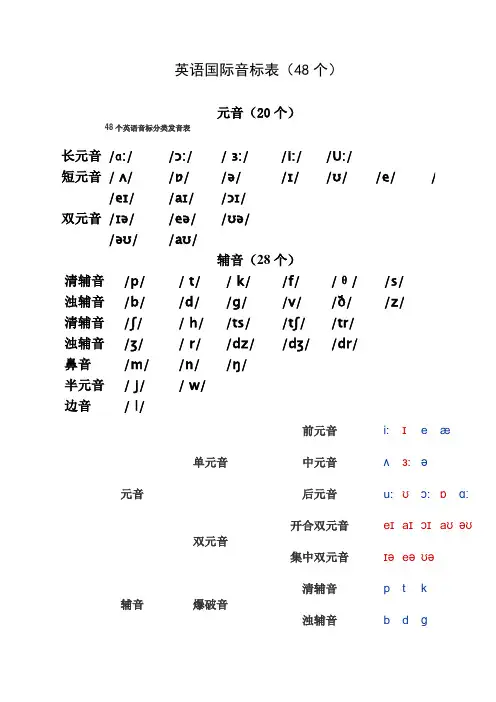
英语国际音标表(48个)元音(20个)48个英语音标分类发音表辅音(28个)清辅音 /p/ / t/ / k/ /f/ /θ/ /s/ 浊辅音 /b/ /d/ /g/ /v/ /ð/ /z/ 清辅音 /ʃ/ / h/ /ts/ /t ʃ/ /tr/ 浊辅音 /ʒ/ / r/ /dz/ /d ʒ/ /dr/ 鼻音 /m/ /n/ /ŋ/半元音 / j/ / w/边音/ ǀ/元音单元音前元音i: ɪ e æ 中元音 ʌ ɜ: ə后元音 u: ʊ ɔ: ɒ ɑ: 双元音开合双元音e ɪ a ɪ ɔɪ a ʊ əʊ 集中双元音 ɪə e ə ʊə 辅音爆破音清辅音p tk浊辅音b d ɡ长元音 /ɑ:/ /ɔ:/ / ɜ:/ /i:/ /U:/ 短元音 / ʌ/ /ɒ/ /ə/ /ɪ/ /ʊ/ /e/ /æ /e ɪ/ /a ɪ/ /ɔɪ/ 双元音 /ɪə//e ə/ /ʊə//əʊ/ /a ʊ/清辅音f sʃθh摩擦音浊辅音v zʒð清辅音tʃtr ts破擦音浊辅音dʒdr dz鼻音(浊辅音)m nŋ舌则音(浊辅音)l r半元音(浊辅音)j w 注:不同词典有不同的音标符号系统,本表为最新DJ英语国际音标表符号新旧英语国际音标对照表辅音新旧无变化。
英语音标及字母组合对照1.元音:1)[i:]字母组合:ee ea e ie ei单词举例:thr ee tr ee gr ee n sh ee p m ee t b ee f s eeea t t ea m ea t l ea ve l ea d t ea cher sp ea kcl ea n pl ea se h e sh e m ep ie ce rec ei ve c ei ling2)[ I ] [i]发音字母: i y e ui u a单词举例:s i t p i g b i g i t i s l i ttle s i xman y happ y d i ctionar yd e fect d e cide del i cious twent y3)[ æ ]发音字母: a单词举例:b a g h a nd h a ppy h a t m a p m a d b a dbl a ck b a ck gl a d m a n4)[e]字母组合: ea e a单词举例:h ea d br ea db e d r e d e lephant rem e mber s e lll e sson b e tter d e sk hot e l y e s5)[З:]ə: 字母组合: ir ur ear er or单词举例:g ir l sh ir t sk ir t th ir ty th ir d b ir dt ur n n ur se t ur tle Th ur sdayl ear n ear tht er m h erw or k w or ld6) [ə] 字母组合er or ar o a单词举例:teach er rememb er play er speak erdoct or act or auth orfamili ar coll ar doll art o gether t o morrow t o day less o na round a ccount a go eleph a ntb a nan a7) [a:] 字母组合: ar a单词举例:c ar f ar m c ar d ar mf a st cl a ss gl a ss pl a nt8) [ ʌ ]发音字母: u o ou oo单词举例:u p l u nch f u n g u n n u t c u p b u sc o me m o ther dose l o ve ab o vetr ou ble bl oo d fl oo d9) [ɔ: ] 字母组合: al or au our ar单词举例:sm al l w al l t al k t al l b al l w al ksh or t m or e lord h or se f or f or ty sp or tau thor au tumn c au ghtf our w ar m10) [ ɔ ] 发音字母: o a([ɒ]) 单词举例:o n h o t l o t f o x b o x d o g r o ckw a nt w a sh w a tch11) [u:]字母组合: oo o u单词举例:f oo d r oo m g oo se t oo thsh o e d o tw otr u e bl u e f u ll12) [u]字母组合: u oo ou单词举例:p u t f u ll p u shl oo k g oo d f oo t b oo k w oo dsh ou ld c ou ld13) [ei] 发音字母 a ay ea ai ey单词举例:n a me c a ke l a te pl a ne A prilpl ay s ay m ay w aygr ea t br ea kr ai n p ai nt pl ai nth ey gr ey14) [ai]发音字母i y单词举例:b i ke f i ne f i nd n i ne l i ght n i ghtm y tr y fl y e y e15) [au] 字母组合:ou ow单词举例:h ou se ou t gr ou nd s ou nd l ou da rou nd m ou sefl ow er d ow n n ow c ow h ow 16)[əʊ] 发音字母: o ow oa[əu]单词举例: h o me c o ld g o n okn ow l ow bel ow gr ow sh owb oa tc oa t g oa l17) [ ɔɪ ]字母组合: oy oi[ɔi]单词举例: b oy t oyoi l s oi l v o ice ch oi ce18) [Iə] 字母组合:eer ear[iə]单词举例:b eer d eerear near id ea19) [ɛə]字母组合: ear air ere[eə]单词举例:p ear b earch air air f airth ere wh ere c are20)[ʊə] 字母组合: ure[uə]单词举例:sure元音字母读音例词a 在开音节中[ei] name plane Jane baby cake在闭音节中[æ] bag dad hat map black backe 在开音节中[i:] he these me Chinese在闭音节中[e] bed let pen desk yes eggi 在开音节中[ai] bike fly drive time nice kite在闭音节中fish big drink sit milk swimo 在开音节中[ou] those close go hoe home no在闭音节中[C] clock not box shop socku 在开音节中[ju:] student excuse duty Tuesday在闭音节中[∧] bus cup jump much lunch在开音节中,元音字母u在辅音字母j l r s后面时读[u:]音,例如:June blue ruler2、辅音清辅音:21. [ p ] 字母组合: p单词举例:p en p et p a p er p lant22. [ t ] 字母组合:t单词举例:t ime t able s t ay t oy23. [ k ]字母组合: k c ck单词举例:k ite k ing k itchen c an c ar c akeTri ck lo ck24. [ f ]字母组合: f ph gh单词举例:f oot f eet f og ph one ph otoele ph ant25. [ θ ]字母组合: th单词举例:th in th ank th ree26.[ s ]字母组合: s c单词举例:s ix s ing s now c inema c ity27. [ ts ]字母组合: ts单词举例:an ts stree ts studen ts28. [ tr ]字母组合: tr单词举例:tr ee tr uck tr y29. [ ʃ]字母组合: sh单词举例:sh ip sh oe sh op sh ort30. [ tʃ ]字母组合: ch单词举例:ch air ch icken ch inese31. [ h ]字母组合: h单词举例:h ot h e h at h as浊辅音32.[ b ]字母组合: b单词举例:b oy b all b ed b ag33.[ d ]字母组合: d单词举例:d og d o d ay d octor34. [ g ]字母组合: g单词举例:g et g o g irl g ood35. [ r ]字母组合: r单词举例:r ed r ead r ain r un36. [ v ]字母组合: v单词举例:v an v oice se v en ele v en37. [ ð ]字母组合: th单词举例:th is th at th ese th ose38.[ z ]字母组合: z s单词举例:z oo z ero pi zz a the se tho se39. [ dz ]字母组合: ds单词举例:be ds han ds40. [ dr ] 字母组合: dr单词举例:dr y dr ink dr ess dr iver41.[ ʒ] 字母组合: si(on)单词举例:42.[ dʒ ] 字母组合: g单词举例:oran ge g entle pa ge其他辅音43. [ m ]字母组合: m单词举例:m any m eat m other m usic44. [ n ]字母组合: n单词举例:n o n ot n oodle n ew n ow45. [ l ] 字母组合: l单词举例:l ook l ong l eft l ight l et46. [ ŋ]字母组合: ng单词举例:lo ng [lɔŋ] si ng47. [ j ]字母组合: y单词举例:y ear y ellow y ou y es48. [ w ] 字母组合: w wh单词举例:w ord w inter w indowWh at wh ere wh en48个音标发音方法元音发音方法/i:/嘴唇微微张开,舌尖抵下齿,嘴角向两边张开,流露出微笑的表情,与字母E的发音相同。
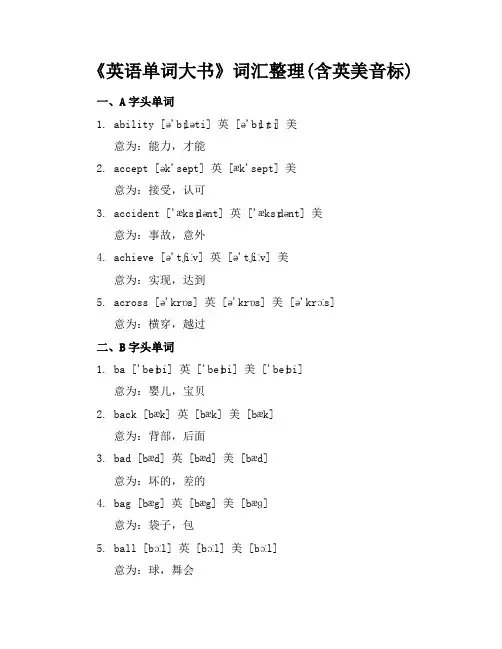
《英语单词大书》词汇整理(含英美音标)一、A字头单词1. ability [ə'bɪləti] 英 [ə'bɪlɪtɪ] 美意为:能力,才能2. accept [ək'sept] 英[æk'sept] 美意为:接受,认可3. accident ['æksɪdənt] 英['æksɪdənt] 美意为:事故,意外4. achieve [ə'tʃiːv] 英 [ə'tʃiːv] 美意为:实现,达到5. across [ə'krɒs] 英 [ə'krɒs] 美 [ə'krɔːs]意为:横穿,越过二、B字头单词1. ba ['beɪbi] 英 ['beɪbi] 美 ['beɪbi]意为:婴儿,宝贝2. back [bæk] 英[bæk] 美[bæk]意为:背部,后面3. bad [bæd] 英[bæd] 美[bæd]意为:坏的,差的4. bag [bæg] 英[bæg] 美[bæɡ]意为:袋子,包5. ball [bɔːl] 英 [bɔːl] 美 [bɔːl]意为:球,舞会三、C字头单词1. call [kɔːl] 英 [kɔːl] 美 [kɔːl]意为:打电话,呼唤2. camera ['kæmərə] 英['kæmərə] 美['kæmərə]意为:相机,摄像机3. camp [kæmp] 英[kæmp] 美[kæmp]意为:露营,营地4. can [kæn] 英[kæn] 美[kæn]意为:能,可以(情态动词);罐头5. cancer ['kænsə] 英['kænsə] 美['kænsər]意为:癌症,恶性肿瘤后续单词整理将陆续更新,敬请期待。
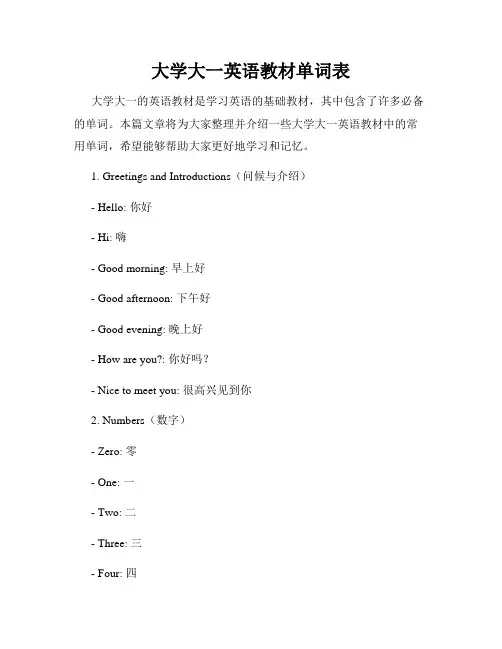
大学大一英语教材单词表大学大一的英语教材是学习英语的基础教材,其中包含了许多必备的单词。
本篇文章将为大家整理并介绍一些大学大一英语教材中的常用单词,希望能够帮助大家更好地学习和记忆。
1. Greetings and Introductions(问候与介绍)- Hello: 你好- Hi: 嗨- Good morning: 早上好- Good afternoon: 下午好- Good evening: 晚上好- How are you?: 你好吗?- Nice to meet you: 很高兴见到你2. Numbers(数字)- Zero: 零- One: 一- Two: 二- Three: 三- Four: 四- Five: 五- Six: 六- Seven: 七- Eight: 八- Nine: 九- Ten: 十3. Colors(颜色)- Red: 红色- Blue: 蓝色- Yellow: 黄色- Green: 绿色- Orange: 橙色- Purple: 紫色- Black: 黑色- White: 白色- Pink: 粉色4. Family(家庭)- Father: 父亲- Mother: 母亲- Brother: 兄弟- Sister: 姐妹- Son: 儿子- Daughter: 女儿- Grandfather: 爷爷/外公- Grandmother: 奶奶/外婆- Uncle: 叔叔/伯伯- Aunt: 阿姨/婶婶- Cousin: 堂兄弟/堂姐妹5. School(学校)- Classroom: 教室- Teacher: 老师- Student: 学生- Desk: 课桌- Chair: 椅子- Book: 书- Pen: 钢笔- Pencil: 铅笔- Notebook: 笔记本- Library: 图书馆- Computer: 计算机6. Daily Routine(日常生活)- Wake up: 起床- Brush teeth: 刷牙- Take a shower: 洗澡- Have breakfast: 吃早餐- Go to school: 上学- Have lunch: 吃午饭- Do homework: 做作业- Have dinner: 吃晚饭- Watch TV: 看电视- Go to bed: 上床睡觉7. Food and Drinks(食物与饮品)- Rice: 米饭- Noodle: 面条- Bread: 面包- Egg: 鸡蛋- Chicken: 鸡肉- Fish: 鱼- Vegetable: 蔬菜- Fruit: 水果- Milk: 牛奶- Tea: 茶8. Daily Activities(日常活动)- Read: 阅读- Write: 写作- Listen: 听- Speak: 说- Sing: 唱歌- Dance: 跳舞- Exercise: 锻炼- Play: 玩耍- Travel: 旅行- Relax: 放松这些单词是大学大一英语教材中常见的单词,掌握它们对于提高英语水平非常重要。
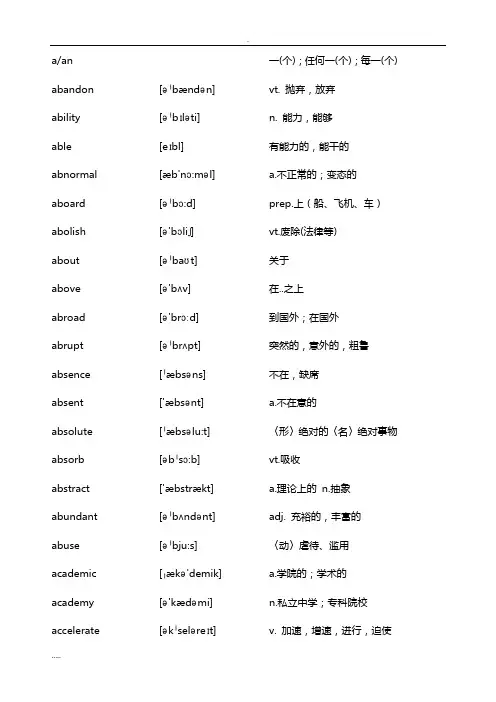
.a/an一(个);任何一(个);每一(个) abandon[əˈbændən]vt. 抛弃,放弃ability[əˈbɪləti]n. 能力,能够able[eɪbl]有能力的,能干的abnormal[æb'nɔ:məl] a.不正常的;变态的aboard[əˈbɔ:d]prep.上(船、飞机、车)abolish[ə'bɔliʃ]vt.废除(法律等)about[əˈbaʊt]关于above[ə'bʌv]在..之上abroad[ə'brɔːd]到国外;在国外abrupt[əˈbrʌpt]突然的,意外的,粗鲁absence[ˈæbsəns]不在,缺席absent['æbsənt] a.不在意的absolute[ˈæbsəlu:t]〈形〉绝对的〈名〉绝对事物absorb[əbˈsɔ:b]vt.吸收abstract['æbstrækt] a.理论上的n.抽象abundant[əˈbʌndənt]adj. 充裕的,丰富的abuse[əˈbju:s]〈动〉虐待、滥用academic[ˌækə'demik] a.学院的;学术的academy[ə'kædəmi]n.私立中学;专科院校accelerate[əkˈseləreɪt]v. 加速,增速,进行,迫使.accent[ˈæksənt]口音,音调accept[əkˈsept]vt.接受acceptable[əkˈseptəbl] a.可接受的access['ækses]n.接近;通道,入口accessible[əkˈsesɪb(ə)l]可到达的,可接受的,易相处的)accident[æksɪdənt]事故,灾难accidental[ˌæksi'dentl] a.偶然的;非本质的accommodation[ə;kɔmə'deiʃən]n.招待设备;预定铺位accompany[əˈkʌmpəni]〈动〉伴随、伴奏accomplish[əˈkʌmplɪʃ]〈动〉完成、实现accordance[ə'kɔ:dəns]n.一致;和谐;授予account[əˈkaʊnt]〈名〉账户、账单〈动〉把……视为、报账accountant[əˈkaʊnt(ə)nt]会计,会计师accumulate[ə'kju:mjuleit]vt.积累vi.堆积accuracy['ækjurəsi]n.准确(性);准确度accurate['ækjurət] a.准确的,正确无误的accuse[ə'kju:z]vt.指责;归咎于accustomed[ə'kʌstəmd] a.惯常的;习惯的ache[eɪk]痛,疼痛.achieve[ə'tʃi:v]vt.完成,实现;达到achievement[ə'tʃi:vmənt]n.完成;成就,成绩acid['æsid]n.酸;酸的,酸性的acknowledge[ək'nɔlidʒ]vt.承认;致谢,鸣谢acquaint[ə'kweint]vt.使认识,使了解acquaintance[ə'kweintəns]n.认识;了解;熟人acquire[ə'kwaiə]vt.取得;获得;学到acquisition[ækwɪˈzɪʃ(ə)n]获得,得到acre[ˈeɪkə]英亩across[ə'krɔːs]穿过,横过act[ækt]表演,扮演(角色),演出(戏);行动,做事action['ækʃən]n.作用;情节active[ˈæktɪv]adj. 活动的,活跃的activity[æk'tɪvɪti]活动actor[ˈæktə(r)]〈名〉男演员actress[ˈæktrəs]n.女演员actual[ˈæktʃuəl]adj. 实际的,现行的acute[ə'kju:t] a.尖的,锐的;敏锐的AD[æd]广告adapt[ə'dæpt]vt.使适应;改编.add[æd]添加,增加addition[ə'diʃən]n.加,加法;附加物additional[ə'diʃənəl] a.附加的,追加的address[əˈdres]地址adequate[ˈædɪkwət]adj. 足够的,充分的adjust[əˈdʒʌst]〈动〉调整、调节administration[əd;minis'treiʃən]n.管理;管理部门admire[ədˈmaɪə(r)]v. 钦佩,赞美,夸奖admission[əd'miʃən]n.允许进入;承认admit[ədˈmɪt]〈动〉承认、容许adopt[ə'dɔpt]vt.收养;采用;采取adult[ˈædʌlt]adj.成熟的;(智力、思想、行为)成熟的;成年人的;成年的advance[ədˈvɑ:ns]〈名〉发展、前进〈动〉促进、提升的〈形〉事先的advanced[ədˈvɑ:nst]高级的,先进的advantage[ədˈvɑ:ntɪdʒ]〈名〉优势、有利条件adventure[ədˈventʃə(r)]〈名〉冒险〈动〉冒险advertise['ædvətaiz]vt.通知vi.登广告advertisement〈名〉广告、宣传.advice[əd'vais]n.劝告;忠告;意见advisable[əd'vaizəbl]n.明智的;可取的advise[əd'vaiz]vt.劝告;建议;通知advocate['ædvəkit]n.辩护者vt.拥护affair[ə'feə]n.事情,事件;事务affect[ə'fekt]vt.影响;感动affection[ə'fekʃən]n.慈爱,爱;爱慕afford[ə'fɔ:d]vt.担负得起…;提供afraid[ə'freɪd]害怕的Africa[ˈæfrikə]n.非洲African[ˈæfrɪkən] a.非洲(人)的n.非洲人after[ˈɑ:ftə(r)]后来,在……之后afternoon[ˌɑ:ftəˈnu:n]下午afterward(s)['ɑ:ftəwəd]ad.后来,以后again[ə'gen]又,再against[ə'genst]与…对抗,对着age[eɪdʒ]vt.变老agency[ˈeɪdʒənsi]代理机构agenda[əˈdʒendə]n.议程agent[ˈeɪdʒənt]代理人,经济人aggressive[ə'gresiv] a.侵略的;好斗的.ago[ə'gəʊ]以前agree[ə'griː]同意,赞成agreement[əˈgri:mənt]〈名〉协定、同意agriculture[ˈæɡrɪkʌltʃə]农业,农学ahead[əˈhed]adv.在前面aid[eid]n.帮助,救护;助手AIDS[eɪdz]艾滋病aim[eim]vi.瞄准,针对;致力air[eə]天空,空气air-conditioning[ˈeəkənˌdɪʃɵnɪŋ]n.空调设备aircraft[ˈɛəkrɑ:ft]n.飞机,航空器airline[eəlaɪn]定期航线airplane/aeroplane['eərəplein]n.飞机airport[ˈɛəpɔ:t]n.机场airway[ˈeəˌweɪ]航线;(常复)航空公司alarm[əˈlɑ:m]〈名〉闹钟、警报器album['ælbəm]n.粘贴簿;相册;文选alcohol[ˈælkəhɒl]n.酒精alert[ə'lə:t] a.警惕的;活跃的alike[ə'laik] a.同样的,相同的alive[ə'laiv] a.活着的;活跃的.all[ɔ:l]全部地;所有的allergic[əˈlɜːdʒɪk]过敏的,厌恶allow[ə'laʊ]允许,准许allowance[ə'lauəns]n津贴,补助费almost[ɔːlməʊst]几乎,差不多alone[əˈləun]adj. 单独的along[əˈlɔŋ]〈副〉沿着、顺着〈介〉沿着……alongside[əlɔŋ'said]prep.在…旁边aloud[əˈlaʊd]大声地alphabet['ælfəbet]n.字母表,字母系统already[ɔːl'redi]已经also[ˈɔ:lsəu]也alter[ˈɔ:ltə(r)]〈动〉改变alternative[ɔ:l'tə:nətiv]n.替换物;取舍,抉择although[ɔːl'ðəʊ]虽然;尽管altogether[ɔːltəˈɡeðə]总共always[ˈɔ:lweɪz]总是;一直;永远am[æm]是a.m./A.M./AM[ˈæntɪmeˈrɪdɪem]午前,上午amateur['æmətə] a.业余的n.业余爱好者amaze[ə'meiz]vt.使惊奇,使惊愕.amazing[ə'meɪzɪŋ]adj.令人惊异的vt.使大为吃惊,使惊奇( amaze的现在分词);使惊异:感到非常好奇n.吃惊;好奇ambassador[æm'bæsədə]n.大使,使节ambition[æm'biʃən]n.雄心,抱负,野心ambitious[æm'biʃəs] a.有雄心的;热望的ambulance[ˈæmbjələns]n.救护车America[əˈmerɪkə]美国American[əˈmerɪkən]美国的;美国人的,美国人among(st)prep.在…之中,在...中间amount[əˈmaʊnt]n. 量,总数,数量amuse[ə'mju:z]vt.逗…乐;给…娱乐amusement[ə'mju:zmənt]n.娱乐,消遣,乐趣analysis[ə'næləsis]n.分析,分解,解析analyze/analyse['ænəlaiz]vt.分析,分解,解析ancestor['ænsəstə]n.祖宗,祖先ancient[ˈeɪnʃənt]〈形〉古老的〈名〉老人、古代人and[ənd]和anger[ˈæŋɡə]怒,愤怒.angle[ˈæŋgl]n.角度,角angry[ˈæŋgri]生气的,愤怒的animal[ˈænɪml]动物ankle['æŋkəl]n.踝,踝节部anniversary[ˌæni'və:səri]n.周年纪念日announce[ə'nauns]vt.报告…的来到announcement[əˈnaʊnsmənt]通告,通知annoy[əˈnɔɪ]v. 使恼怒,打扰another[əˈnʌðə(r)]另一个answer['ɑ:nsə]vi.符合,适合ant[ænt]蚂蚁antarctic[æn'tɑ:ktik] a.南极的n.南极区Antarctica[æntˈɑ:ktɪkə,]南极洲anticipate[æn'tisipeit]vt.预料,预期,期望antique[æn'ti:k] a.古代的n.古物anxiety[æŋ'zaiəti]n.焦虑,忧虑;渴望anxious[ˈæŋkʃəs]adj. 渴望的any[eni](用于否定句,疑问句等)什么,任何anybody['eni;bɔdi]n.重要人物anyhow[ˈenɪhaʊ]不管怎样.anyone[enɪwʌn]任何人anything[ˈeniθɪŋ]任何东西anyway[ˈeniweɪ]adv.不论以何种方式anywhere[enɪhweə]任何地方apart[əˈpɑːt]相隔,相距,除外apartment n.[英]房间,套间;[美]公寓apologize/apologise vi.道歉,谢罪,认错apology[əˈpɒlədʒi]道歉;歉意apparent[ə'pærənt] a.显然的appeal[ə'pi:l]vi.&n.呼吁;申述appealing[əˈpi:lɪŋ]adj.吸引人的appear[əˈpiə]vt. 出现,似乎appearance[əˈpɪərəns]出现,露面;容貌appetite[ˈæpɪtaɪt]食欲,胃口applaud[ə'plɔ:d]vt.喝彩;欢呼vi.欢呼applause[ə'plɔ:z]n.喝彩;夸奖,称赞apple[ˈæpl]苹果application[ˌæpli'keiʃən]n.请求,申请;施用apply[ə'plai]vt.应用,实施,使用appoint[ə'pɔint]vt.任命,委任;约定appointment[ə'pɔintmənt]n.任命;约定,约会.appreciate[ə'pri:ʃieit]vt.欣赏;领会;感谢appreciation[ə;pri:ʃi'eiʃən]n.欣赏;鉴别;感激approach[ə'prəutʃ]vt.向…靠近n.靠近appropriate[ə'prəuprieit] a.适当的,恰当的approximately[ə'prɔksimətli]ad.近似地,大约april['eiprəl]n.四月arab[ˈærəb]阿拉伯的阿拉伯人arabic[ˈærəbɪk]阿拉伯语的阿拉伯语arbitrary['ɑ:bitrəri] a.随心所欲的;专断的architect['ɑ:kitekt]n.建筑师;创造者architecture['ɑ:kitektʃə]n.建筑学;建筑式样arctic['ɑ:ktik] a.北极的n.北极area[ˈɛəriə]n.面积;地区,地域;领域,范围argue[ˈɑ:gju:]vi.争论,争辩,辩论argument[ˈɑ:gjumənt]n.争论(吵),辩论;理由;论证arise[ə'raiz]vi.出现;由…引起arithmetic[əˈrɪθmətɪk]n. 算术arm[ɑ:m]n.手臂,扶手,臂状物v.武装;配备n.武器army[ˈɑ:mi]n.军队,陆军,军;大群,大.批around[əˈraʊnd]ad.在...周围,到处prep.在..四周(或附近)arouse[ə'rauz]vt.引起,唤起;唤醒arrange[əˈreɪndʒ]v. 排列arrangement[əˈreɪndʒmənt]安排,布置arrest[əˈrest]n.逮捕,扣留vt.逮捕,扣留;阻止;吸引arrival[əˈraɪvl]n.到达,到来;到达者,到达物arrive[əˈraɪv]vi.到达;(时间、事件)到来,发生;达到arrow[ˈærəu]n.箭,矢,箭状物;箭头符号art[ɑ:t]n.艺术,美术;技术,技艺;文科,人文科学article[ˈɑ:tɪkl]n. 论文,物品artificial[ˌɑ:tɪˈfɪʃl]a.人工的,人造的,人为的;虚伪的,做作的artist[ˈɑ:tɪst]n.艺术家,美术家;(某方面的)能手artwork[ˈɑ:twə:k]n.艺术品;插图.as[əz]ad.同样地conj.由于;像...一样prep.作为ash[æʃ]n.灰,灰末;(pl.)骨灰;(pl.)废墟ashamed[əˈʃeɪmd] a.惭愧的,羞耻的,害臊的asia[ˈeɪʃə]n.亚洲asian[ˈeɪʃn] a.亚洲(人)的n.亚洲人aside[əˈsaɪd]ad.在旁边,到一边n.旁白;离题的话ask[ɑ:sk]vt.问,询问;请求,要求;邀请,约请asleep[əˈsli:p]〈形〉睡着的〈副〉睡着aspect[ˈæspekt]n. 方面,样子,外表aspiration[ˌæspəˈreɪʃn]n. 热望,渴望assemble[əˈsembl]vt. 聚集assembly[əˈsembli]n. 集会assert[ə'sə:t]vt.断言,宣称;维护assess[ə'ses]vt.对(财产等)估价asset[ˈæset]n. 财产,财富assignment[ə'sainmənt]n.任务,指定的作业assist[ə'sist]vt.援助,帮助;搀扶.assistance[əˈsɪstəns]n.协作; 援助; 帮助assistant[ə'sistənt]n.助手,助理;助教associate[ə'səuʃieit]vi.交往n.伙伴,同事association[ə;səusi'eiʃən]n.协会,团体;联合assume[ə'sju:m]vt.假定;承担;呈现assumption[ə'sʌmpʃən]n.采取;假定;傲慢assure[ə'ʃuə]vt.使确信;向…保证astonish[əˈstɒnɪʃ]vt. 使惊讶astronomer[əˈstrɒnəmə]天文学家at prep.[表示价格、速度等]以,达;在..方面athlete['æθlit, 'æθli:t]n.运动员;田径运动员atlantic[ætˈlæntɪk]a.大西洋的n.[the Atlantic]大西洋atmosphere[ˈætməsfɪə(r)]n. 气氛,大气层atom['ætəm]n.微粒;微量atomic[əˈtɔmik]adj.原子的;原子能的attach[ə'tætʃ]vt.缚,系,贴;附加attack[ə'tæk]vt.&vi.&n.攻击,进攻attain[ə'tein]vt.达到,获得,完成attempt[ə'tempt]vt.尝试,试图n.企图.attend[əˈtend]vt. 参加attendance[ə'tendəns]n.到场;出席人数attention[əˈtenʃn]n.注意,注意力;立正;特别照顾;照料attentively[ə'tentɪvli]注意地attitude[ˈætitju:d]n.态度,看法(to, toward, about);姿势attract[əˈtrækt]vt.引起的注意(或兴趣等),吸引;引起;激起attraction[əˈtrækʃ(ə)n]吸引,爱慕attractive[əˈtræktɪv]a.吸引人的,引人注意的;漂亮的,迷人的attribute[ə'tribju:t]vt.把…归因于n.属性audience['ɔ:diəns]n.正式会见;拜会audio[ˈɔːdiəʊ]n./a.音频(响)(的);声音(的),听觉(的)august[ˈɔ:gəst]n.8月aunt[ɑ:nt]n.姨母,姑母,伯母,婶母,舅母,阿姨australia[ɔ'streiliə]n.澳大利亚australian[ɔ'streiliən] a.澳大利亚的.authentic[ɔ:ˈθentɪk]adj. 可靠,又根据,真实的author['ɔ:θə]n.创造者,创始人authority[ɔ:'θɔriti]n.当局,官方;权力auto[ˈɔːtəʊ]n.(automobile)(口语)汽车automate[ˈɔ:təmeɪt]vt.&vi.(使)自动化automatic[ˌɔ:tə'mætik] a.自动的;机械的automobile['ɔ:təməbi:l]n.汽车,机动车autumn[ˈɔ:təm]n.秋,秋季;成熟期,渐衰期available[ə'veiləbəl] a.可利用的;通用的avenue[ˈævənju:]n.林荫路,大街;(比喻)途径,渠道,方法average[ˈævərɪdʒ]adj. 一般的,平均的avoid[əˈvɔɪd]vt. 避免。
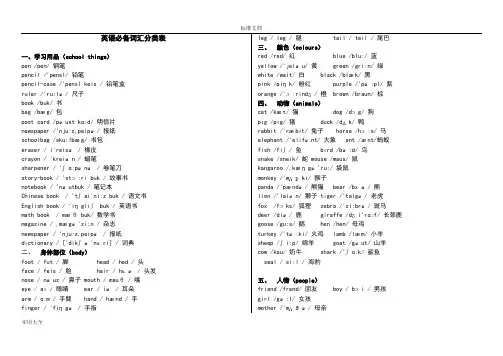

⾃考英语⼆(课程代码:00015)单词4500个(含⾳标)a/an ⼀(个);任何⼀(个);每⼀(个)abandon[??b?nd?n]vt. 抛弃,放弃ability[??b?l?ti]n. 能⼒,能够able[e?bl]有能⼒的,能⼲的abnormal[?b'n?:m?l] a.不正常的;变态的aboard[??b?:d]prep.上(船、飞机、车)abolish[?'b?li?]vt.废除(法律等)about[??ba?t]关于above[?'b?v]在..之上abroad[?'br??d]到国外;在国外abrupt[??br?pt]突然的,意外的,粗鲁absence[??bs?ns]不在,缺席absent['?bs?nt] a.不在意的absolute[??bs?lu:t]〈形〉绝对的〈名〉绝对事物absorb[?b?s?:b]vt.吸收abstract['?bstr?kt] a.理论上的 n.抽象abundant[??b?nd?nt]adj. 充裕的,丰富的abuse[??bju:s]〈动〉虐待、滥⽤academic[??k?'demik] a.学院的;学术的academy[?'k?d?mi]n.私⽴中学;专科院校accelerate[?k?sel?re?t]v. 加速,增速,进⾏,迫使accent[??ks?nt]⼝⾳,⾳调accept[?k?sept]vt.接受acceptable[?k?sept?bl] a.可接受的access['?kses]n.接近;通道,⼊⼝accessible[?k?ses?b(?)l]可到达的,可接受的,易相处的)accident[?ks?d?nt]事故,灾难accidental[??ksi'dentl] a.偶然的;⾮本质的accommodation[?;k?m?'dei??n]n.招待设备;预定铺位accompany[??k?mp?ni]〈动〉伴随、伴奏accomplish[??k?mpl??]〈动〉完成、实现accordance[?'k?:d?ns]n.⼀致;和谐;授予account[??ka?nt]〈名〉账户、账单〈动〉把……视为、报账accountant[??ka?nt(?)nt]会计,会计师accumulate[?'kju:mjuleit]vt.积累 vi.堆积accuracy['?kjur?si]n.准确(性);准确度accurate['?kjur?t] a.准确的,正确⽆误的accuse[?'kju:z]vt.指责;归咎于精品⽂档accustomed[?'k?st?md] a.惯常的;习惯的ache[e?k]痛,疼痛achieve[?'t?i:v]vt.完成,实现;达到achievement[?'t?i:vm?nt]n.完成;成就,成绩acid['?sid]n.酸;酸的,酸性的acknowledge[?k'n?lid?]vt.承认;致谢,鸣谢acquaint[?'kweint]vt.使认识,使了解acquaintance[?'kweint?ns]n.认识;了解;熟⼈acquire[?'kwai?]vt.取得;获得;学到acquisition[?kw??z??(?)n]获得,得到acre[?e?k?]英亩across[?'kr??s]穿过,横过act[?kt]表演,扮演(⾓⾊),演出(戏);⾏动,做事action['?k??n]n.作⽤;情节active[??kt?v]adj. 活动的,活跃的activity[?k't?v?ti]活动actor[??kt?(r)]〈名〉男演员actress[??ktr?s]n.⼥演员actual[??kt?u?l]adj. 实际的,现⾏的acute[?'kju:t] a.尖的,锐的;敏锐的AD[?d]⼴告adapt[?'d?pt]vt.使适应;改编add[?d]添加,增加addition[?'di??n]n.加,加法;附加物additional[?'di??n?l] a.附加的,追加的address[??dres]地址adequate[??d?kw?t]adj. ⾜够的,充分的adjust[??d??st]〈动〉调整、调节administration[?d;minis'trei??n]n.管理;管理部门admire[?d?ma??(r)]v. 钦佩,赞美,夸奖admission[?d'mi??n]n.允许进⼊;承认admit[?d?m?t]〈动〉承认、容许adopt[?'d?pt]vt.收养;采⽤;采取adult[??d?lt]adj.成熟的;(智⼒、思想、⾏为)成熟的;成年⼈的;成年的advance[?d?vɑ:ns]〈名〉发展、前进〈动〉促进、提升的〈形〉事先的advanced[?d?vɑ:nst]⾼级的,先进的advantage[?d?vɑ:nt?d?]〈名〉优势、有利条件精品⽂档adventure[?d?vent??(r)]〈名〉冒险〈动〉冒险advertise['?dv?taiz]vt.通知 vi.登⼴告advertisement〈名〉⼴告、宣传advice[? d'vais]n.劝告;忠告;意见advisable[?d'vaiz?bl]n.明智的;可取的advise[?d'vaiz]vt.劝告;建议;通知advocate['?dv?kit]n.辩护者 vt.拥护affair[?'fe?]n.事情,事件;事务affect[?'fekt]vt.影响;感动affection[?'fek??n]n.慈爱,爱;爱慕afford[?'f?:d]vt.担负得起…;提供afraid[?'fre?d]害怕的Africa[??frik?]n.⾮洲African[??fr?k?n] a.⾮洲(⼈)的 n.⾮洲⼈after[?ɑ:ft?(r)]后来,在……之后afternoon[?ɑ:ft??nu:n]下午afterward(s)['ɑ:ft?w?d]ad.后来,以后again[?'gen]⼜,再against[?'genst]与…对抗,对着age[e?d?]vt.变⽼agency[?e?d??nsi]代理机构agenda[??d?end?]n.议程agent[?e?d??nt]代理⼈,经济⼈aggressive[?'gresiv] a.侵略的;好⽃的ago[?'g??]以前agree[?'gri?]同意,赞成agreement[??gri:m?nt]〈名〉协定、同意agriculture[??ɡr?k?lt??]农业,农学ahead[??hed]adv.在前⾯aid[eid]n.帮助,救护;助⼿AIDS[e?dz]艾滋病aim[eim]vi.瞄准,针对;致⼒air[e?]天空,空⽓air-conditioning[?e?k?n?dn??]n.空调设备aircraft[krɑ:ft]n.飞机,航空器airline[e?la?n]定期航线airplane/aeroplane['e?r?plein]n.飞机airport[p?:t]n.机场airway[?e??we?]航线;(常复)航空公司alarm[??lɑ:m]〈名〉闹钟、警报器精品⽂档album['?lb?m]n.粘贴簿;相册;⽂选alcohol[??lk?h?l]n.酒精alert[?'l?:t] a.警惕的;活跃的alike[?'laik] a.同样的,相同的alive[?'laiv] a.活着的;活跃的all[?:l]全部地;所有的allergic[??l??d??k]过敏的,厌恶allow[?'la?]允许,准许allowance[?'lau?ns]n津贴,补助费almost[??lm??st]⼏乎,差不多alone[??l?un]adj. 单独的along[??l??]〈副〉沿着、顺着〈介〉沿着……alongside[?l??'said]prep.在…旁边aloud[??la?d]⼤声地alphabet['?lf?bet]n.字母表,字母系统already[??l'redi]已经also[??:ls?u]也alter[??:lt?(r)]〈动〉改变alternative[?:l't?:n?tiv]n.替换物;取舍,抉择although[??l'e??]虽然;尽管altogether[??lt??ɡee?]总共always[??:lwe?z]总是;⼀直;永远am[?m]是a.m./A.M./AM[??nt?me?r?d?em]午前,上午amateur['?m?t?] a.业余的n.业余爱好者amaze[?'meiz]vt.使惊奇,使惊愕amazing[?'me?z??]adj.令⼈惊异的vt.使⼤为吃惊,使惊奇( amaze的现在分词);使惊异:感到⾮常好奇n.吃惊;好奇ambassador[?m'b?s?d?]n.⼤使,使节ambition[?m'bi??n]n.雄⼼,抱负,野⼼ambitious[?m'bi??s] a.有雄⼼的;热望的ambulance[??mbj?l?ns]n.救护车America[??mer?k?]美国American[??mer?k?n]美国的;美国⼈的,美国⼈among(st)prep.在…之中,在...中间amount[??ma?nt]n. 量,总数,数量amuse[?'mju:z]vt.逗…乐;给…娱乐amusement[?'mju:zm?nt]n.娱乐,消遣,乐趣精品⽂档。
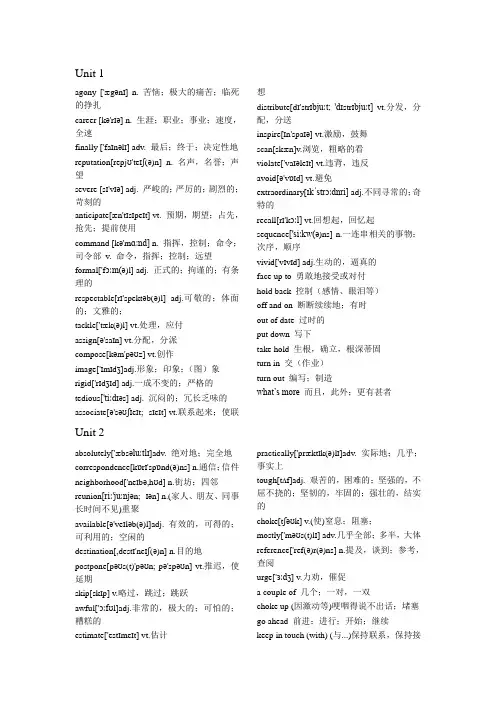
Unit 1agony ['ægənɪ] n. 苦恼;极大的痛苦;临死的挣扎career [kə'rɪə] n. 生涯;职业;事业;速度,全速finally ['faɪnəlɪ] adv. 最后;终于;决定性地reputation[repjʊ'teɪʃ(ə)n] n. 名声,名誉;声望severe [sɪ'vɪə] adj. 严峻的;严厉的;剧烈的;苛刻的anticipate[æn'tɪsɪpeɪt] vt. 预期,期望;占先,抢先;提前使用command [kə'mɑːnd] n. 指挥,控制;命令;司令部v. 命令,指挥;控制;远望formal['fɔːm(ə)l] adj. 正式的;拘谨的;有条理的respectable[rɪ'spektəb(ə)l] adj.可敬的;体面的;文雅的;tackle['tæk(ə)l] vt.处理,应付assign[ə'saɪn] vt.分配,分派compose[kəm'pəʊz] vt.创作image['ɪmɪdʒ]adj.形象;印象;(图)象rigid['rɪdʒɪd] adj.一成不变的;严格的tedious['tiːdɪəs] adj. 沉闷的;冗长乏味的associate[ə'səʊʃɪeɪt; -sɪeɪt] vt.联系起来;使联想distribute[dɪ'strɪbjuːt; 'dɪstrɪbjuːt] vt.分发,分配,分送inspire[ɪn'spaɪə] vt.激励,鼓舞scan[skæn]v.浏览,粗略的看violate['vaɪəleɪt] vt.违背,违反avoid[ə'vɒɪd] vt.避免extraordinary[ɪkˈstrɔːdnri] adj.不同寻常的;奇特的recall[rɪ'kɔːl] vt.回想起,回忆起sequence['siːkw(ə)ns] n.一连串相关的事物;次序,顺序vivid['vɪvɪd] adj.生动的,逼真的face up to 勇敢地接受或对付hold back 控制(感情、眼泪等)off and on 断断续续地;有时out of date 过时的put down 写下take hold 生根,确立,根深蒂固turn in 交(作业)turn out 编写;制造what’s more 而且,此外;更有甚者Unit 2absolutely['æbsəluːtlɪ]adv. 绝对地;完全地correspondence[kɒrɪ'spɒnd(ə)ns] n.通信;信件neighborhood['neɪbə,hʊd] n.街坊;四邻reunion[riː'juːnjən; -ɪən] n.(家人、朋友、同事长时间不见)重聚available[ə'veɪləb(ə)l]adj. 有效的,可得的;可利用的;空闲的destination[,destɪ'neɪʃ(ə)n] n.目的地postpone[pəʊs(t)'pəʊn; pə'spəʊn] vt.推迟,使延期skip[skɪp] v.略过,跳过;跳跃awful['ɔːfʊl]adj.非常的,极大的;可怕的;糟糕的estimate['estɪmeɪt] vt.估计practically['præktɪk(ə)lɪ]adv. 实际地;几乎;事实上tough[tʌf]adj. 艰苦的,困难的;坚强的,不屈不挠的;坚韧的,牢固的;强壮的,结实的choke[tʃəʊk] v.(使)窒息;阻塞;mostly['məʊs(t)lɪ] adv.几乎全部;多半,大体reference['ref(ə)r(ə)ns] n.提及,谈到;参考,查阅urge['ɜːdʒ] v.力劝,催促a couple of 几个;一对,一双choke up (因激动等)哽咽得说不出话;堵塞go ahead 前进;进行;开始;继续keep in touch (with) (与...)保持联系,保持接触know/learn by heart 记住,能背出not much of a 不太好的right away 立刻all the way 自始至终,一直come up (尤指意想不到的)发生,出现go by (时间)逝去keep up 保持lose touch 失去联系on one’s mind 记挂在心头be lost in/lose oneself in 专心致志于every now and then 不时的,常常hang out 闲荡;徘徊kind of/sort of 有点,有几分might/may(just)as well 不妨,无妨or something 诸如此类的事Unit 3anyway['enɪweɪ] adv.不管怎么说competition[kɒmpɪ'tɪʃ(ə)n] n.竞争;比赛educate['edjʊkeɪt] vt.教育global['gləʊb(ə)l] adj. 全球的;总体的;球形的initiative[ɪ'nɪʃɪətɪv; -ʃə-] n.首创精神;主动proportion[prə'pɔːʃ(ə)n] n.比例;部分sufficient[sə'fɪʃ(ə)nt] adj. 足够的;充分的background['bækgraʊnd] n.背景concept['kɒnsept] n.概念ensure[ɪn'ʃɔː; -'ʃʊə; en-] vt.保证,确保grasp[grɑːsp] n.掌握,了解likely ['laɪklɪ] adj.可能的adv.可能rate[reɪt] n.速度;比率tend[tend] vi.倾向,趋向basis['beɪsɪs] n.基础contact['kɒntækt] vt.与.....接触entertain[entə'teɪn] vt.给...以欢乐;招待hence[hens] adv.因此;从此moreover[mɔːr'əʊvə] adv.而且,再者responsibility[rɪ,spɒnsɪ'bɪlɪtɪ] n.责任brief[briːf] adj.简洁的;短暂的convey[kən'veɪ] vt.传达;表达evident['evɪd(ə)nt] adj.明显的highly ['haɪlɪ] adv.很,非常precise[prɪ'saɪs] adj.精确的steady['stedɪ] adj.平稳的;稳定的at the moment 立刻,目前,此刻do without 没有.....而设法对付过去in the form of 以....形式;呈......形状put across 解释清楚,使被理解bring about 引起,导致fit into 适合;符合;属于in two minds 犹豫不决,三心二意put/turn the clock back 倒退,开倒车cut off 切断,中断;切下,剪下in terms of 从.....方面(或角度)来说;按照,根据lie in 在于slow down 减慢Unit 4assume[ə'sjuːm] vt.假设;以为determination[dɪ,tɜːmɪ'neɪʃ(ə)n] n.决定;决心hunt[hʌnt] v.寻找;打猎,猎取property['prɒpətɪ] n.地产;财产wreck[rek] n.残破物;(尤指失事船只、飞机等的)残骸balance['bæl(ə)ns] n.平衡;余额diet['daɪət] n.日常饮食loan[ləʊn] vt.借,贷n.贷款;借,贷skilled[skɪld] adj.熟练的,有技巧的;技术性的capacity[kə'pæsɪtɪ] n.能力,才能discard [dɪ'skɑːd] vt.抛弃personnel[pɜːsə'nel] n.人事部门;全体人员,全体职员sometime['sʌmtaɪm] adv.某个时候character['kærəktə] n.(人的)品德;品质;性格giant['dʒaɪənt] adj.巨大的n.巨人precision[prɪ'sɪʒ(ə)n] n.精密;精确sponsor ['spɒnsə] vt. 为.....做保证人;主办,发起n.保证人;主办者,发起人confidence['kɒnfɪd(ə)ns] n.信心handle['hænd(ə)l] vt.管理,处理;操纵principle['prɪnsɪp(ə)l] n.信条;原则;原理weekly['wiːklɪ] adj.每周的;一周一次的above all 最重要的是do with 对待,处理turn away 拒绝帮助;不让.....进入call on 拜访for sale 待售turn down 拒绝check on 检查;调查;察看pass away 去世work out 制定出;解决;算出clean up 打扫,清楚send for 派人去叫,召唤;派人去取Unit 5acquaintance[ə'kweɪnt(ə)ns] n.相识的人;(略微的)了解executive[ɪg'zekjʊtɪv; eg-] n.(企业等中的)行政领导;管理人员manufacture[mænjʊ'fæktʃə] vt.大量制造replace[rɪ'pleɪs] vt. 代替,取代belove[bɪ'lʌvɪd; -'lʌvd] adj.深爱的;亲爱的favorite ['feɪvərɪt] n.特别受喜爱的人(或物)married['mærɪd] adj.结婚的;已婚的replacement[rɪ'pleɪsm(ə)nt] n.接替者,替代物classic['klæsɪk] n.典范;典型adj.典型的finance[faɪ'næns; fɪ-; 'faɪnæns] n.财政;金融;(pl)财源;财力monthly['mʌnθlɪ] adj.每月的;每月一次的retire[rɪ'taɪə] vi.退休compete[kəm'piːt] vi.竞争;对抗inquiry[ɪn'kwaɪrɪ] n.打听,询问odd[ɒd] adj.临时的,不固定的stock[stɒk] n.股票;证券;公债embarrass[ɪm'bærəs; em-] vt.使尴尬;使局促不安instantly['ɪnst(ə)ntlɪ] adv.立刻;马上option['ɒpʃ(ə)n] n.期权;选择survive[sə'vaɪv] v.比...活得长;经历...后幸存and (all) that 诸如此类的give up 放弃stay up 醒着;不去睡ask around 四处打听grab at 抓住,夺得straighten out 解决care for 照看;照顾look(sb)in the eye 直视某人die of 死于pick out 辨认出,分辨出Unit 6absorb[əb'zɔːb; -'sɔːb] vt.完全吸引住...的注意;吸收fertile['fɜːtaɪl] adj.肥沃的,富饶的hesitate['hezɪteɪt] vi.踌躇,犹豫overseas[əʊvə'siːz] adv.去(在)国外(的),去(在)海外(的)split[splɪt] v.(使)裂开;破裂wisdom['wɪzdəm] n.智慧;明智broaden['brɔːd(ə)n] v.(使)变宽;(使)扩大glow[gləʊ] n.光亮,光辉identify[aɪ'dentɪfaɪ] vt.识别previous['priːvɪəs] adj.早先的,先前的sustain[sə'steɪn] vt.支持;使(努力等)持续下去,保持bud[bʌd] v.发芽;萌芽n.(枝叶的)芽;花蕾grand[grænd] adj.宏伟的;壮丽的keen[kiːn] adj.强烈的;热切的reflect[rɪ'flekt] vt.反映,显示thoughtful['θɔːtfʊl; -f(ə)l] adj.深思的;体贴的correspond[kɒrɪ'spɒnd] vi.通信grateful['greɪtfʊl; -f(ə)l] adj.感激的locate [lə(ʊ)'keɪt] vt.找到...的位置;使坐落于sensible['sensɪb(ə)l] adj.通情达理的,理智的thrust[θrʌst] v.挤入;插入,猛推disgust[dɪs'gʌst] vt.使厌恶,使反感grip[grɪp] v.握紧,紧握margin['mɑːdʒɪn] n.页边空白slim[slɪm] adj.苗条的;细小的;微小的whichever[wɪtʃ'evə] pron.无论哪个或哪些be grateful to(sb.)for(sth.) 因(某事)而感激(某人)make one’s way 走去go sb.’s way 与某人同路more than a little 很,非常in response to 作为对....的回应take a chance(on sth.) 碰运气;冒险。
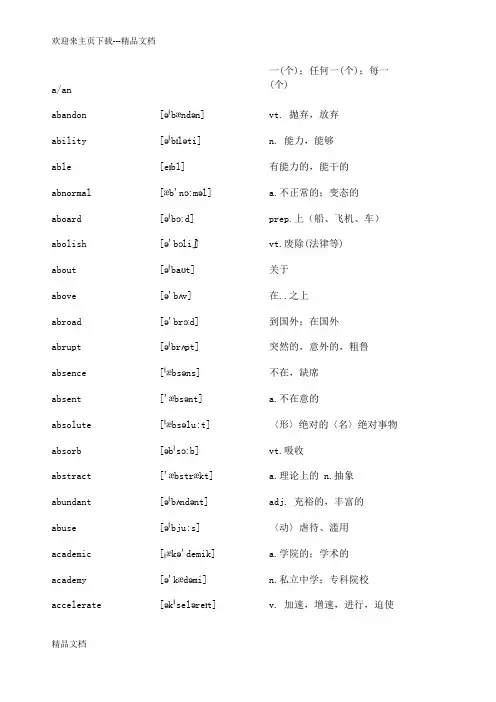
a/an 一(个);任何一(个);每一(个)abandon[əˈbændən]vt. 抛弃,放弃ability[əˈbɪləti]n. 能力,能够able[eɪbl]有能力的,能干的abnormal[æb'nɔ:məl] a.不正常的;变态的aboard[əˈbɔ:d]prep.上(船、飞机、车)abolish[ə'bɔliʃ]vt.废除(法律等)about[əˈbaʊt]关于above[ə'bʌv]在..之上abroad[ə'brɔːd]到国外;在国外abrupt[əˈbrʌpt]突然的,意外的,粗鲁absence[ˈæbsəns]不在,缺席absent['æbsənt] a.不在意的absolute[ˈæbsəlu:t]〈形〉绝对的〈名〉绝对事物absorb[əbˈsɔ:b]vt.吸收abstract['æbstrækt] a.理论上的 n.抽象abundant[əˈbʌndənt]adj. 充裕的,丰富的abuse[əˈbju:s]〈动〉虐待、滥用academic[ˌækə'demik] a.学院的;学术的academy[ə'kædəmi]n.私立中学;专科院校accelerate[əkˈseləreɪt]v. 加速,增速,进行,迫使accent[ˈæksənt]口音,音调accept[əkˈsept]vt.接受acceptable[əkˈseptəbl] a.可接受的access['ækses]n.接近;通道,入口accessible[əkˈsesɪb(ə)l]可到达的,可接受的,易相处的)accident[æksɪdənt]事故,灾难accidental[ˌæksi'dentl] a.偶然的;非本质的accommodation[ə;kɔmə'deiʃən]n.招待设备;预定铺位accompany[əˈkʌmpəni]〈动〉伴随、伴奏accomplish[əˈkʌmplɪʃ]〈动〉完成、实现accordance[ə'kɔ:dəns]n.一致;和谐;授予account[əˈkaʊnt]〈名〉账户、账单〈动〉把……视为、报账accountant[əˈkaʊnt(ə)nt]会计,会计师accumulate[ə'kju:mjuleit]vt.积累 vi.堆积accuracy['ækjurəsi]n.准确(性);准确度accurate['ækjurət] a.准确的,正确无误的accuse[ə'kju:z]vt.指责;归咎于accustomed[ə'kʌstəmd] a.惯常的;习惯的ache[eɪk]痛,疼痛achieve[ə'tʃi:v]vt.完成,实现;达到achievement[ə'tʃi:vmənt]n.完成;成就,成绩acid['æsid]n.酸;酸的,酸性的acknowledge[ək'nɔlidʒ]vt.承认;致谢,鸣谢acquaint[ə'kweint]vt.使认识,使了解acquaintance[ə'kweintəns]n.认识;了解;熟人acquire[ə'kwaiə]vt.取得;获得;学到acquisition[ækwɪˈzɪʃ(ə)n]获得,得到acre[ˈeɪkə]英亩across[ə'krɔːs]穿过,横过act[ækt]表演,扮演(角色),演出(戏);行动,做事action['ækʃən]n.作用;情节active[ˈæktɪv]adj. 活动的,活跃的activity[æk'tɪvɪti]活动actor[ˈæktə(r)]〈名〉男演员actress[ˈæktrəs]n.女演员actual[ˈæktʃuəl]adj. 实际的,现行的acute[ə'kju:t] a.尖的,锐的;敏锐的AD[æd]广告adapt[ə'dæpt]vt.使适应;改编add[æd]添加,增加addition[ə'diʃən]n.加,加法;附加物additional[ə'diʃənəl] a.附加的,追加的address[əˈdres]地址adequate[ˈædɪkwət]adj. 足够的,充分的adjust[əˈdʒʌst]〈动〉调整、调节administration[əd;minis'treiʃən]n.管理;管理部门admire[ədˈmaɪə(r)]v. 钦佩,赞美,夸奖admission[əd'miʃən]n.允许进入;承认admit[ədˈmɪt]〈动〉承认、容许adopt[ə'dɔpt]vt.收养;采用;采取adult[ˈædʌlt]adj.成熟的;(智力、思想、行为)成熟的;成年人的;成年的advance[ədˈvɑ:ns]〈名〉发展、前进〈动〉促进、提升的〈形〉事先的advanced[ədˈvɑ:nst]高级的,先进的advantage[ədˈvɑ:ntɪdʒ]〈名〉优势、有利条件adventure[ədˈventʃə(r)]〈名〉冒险〈动〉冒险advertise['ædvətaiz]vt.通知 vi.登广告advertisement〈名〉广告、宣传advice[əd'vais]n.劝告;忠告;意见advisable[əd'vaizəbl]n.明智的;可取的advise[əd'vaiz]vt.劝告;建议;通知advocate['ædvəkit]n.辩护者 vt.拥护affair[ə'feə]n.事情,事件;事务affect[ə'fekt]vt.影响;感动affection[ə'fekʃən]n.慈爱,爱;爱慕afford[ə'fɔ:d]vt.担负得起…;提供afraid[ə'freɪd]害怕的Africa[ˈæfrikə]n.非洲African[ˈæfrɪkən] a.非洲(人)的 n.非洲人after[ˈɑ:ftə(r)]后来,在……之后afternoon[ˌɑ:ftəˈnu:n]下午afterward(s)['ɑ:ftəwəd]ad.后来,以后again[ə'gen]又,再against[ə'genst]与…对抗,对着age[eɪdʒ]vt.变老agency[ˈeɪdʒənsi]代理机构agenda[əˈdʒendə]n.议程agent[ˈeɪdʒənt]代理人,经济人aggressive[ə'gresiv] a.侵略的;好斗的ago[ə'gəʊ]以前agree[ə'griː]同意,赞成agreement[əˈgri:mənt]〈名〉协定、同意agriculture[ˈæɡrɪkʌltʃə]农业,农学ahead[əˈhed]adv.在前面aid[eid]n.帮助,救护;助手AIDS[eɪdz]艾滋病aim[eim]vi.瞄准,针对;致力air[eə]天空,空气air-conditioning[ˈeəkənˌdɪʃɵnɪŋ]n.空调设备aircraft[ˈɛəkrɑ:ft]n.飞机,航空器airline[eəlaɪn]定期航线airplane/aeroplane['eərəplein]n.飞机airport[ˈɛəpɔ:t]n.机场airway[ˈeəˌweɪ]航线;(常复)航空公司alarm[əˈlɑ:m]〈名〉闹钟、警报器album['ælbəm]n.粘贴簿;相册;文选alcohol[ˈælkəhɒl]n.酒精alert[ə'lə:t] a.警惕的;活跃的alike[ə'laik] a.同样的,相同的alive[ə'laiv] a.活着的;活跃的all[ɔ:l]全部地;所有的allergic[əˈlɜːdʒɪk]过敏的,厌恶allow[ə'laʊ]允许,准许allowance[ə'lauəns]n津贴,补助费almost[ɔːlməʊst]几乎,差不多alone[əˈləun]adj. 单独的along[əˈlɔŋ]〈副〉沿着、顺着〈介〉沿着……alongside[əlɔŋ'said]prep.在…旁边aloud[əˈlaʊd]大声地alphabet['ælfəbet]n.字母表,字母系统already[ɔːl'redi]已经also[ˈɔ:lsəu]也alter[ˈɔ:ltə(r)]〈动〉改变alternative[ɔ:l'tə:nətiv]n.替换物;取舍,抉择although[ɔːl'ðəʊ]虽然;尽管altogether[ɔːltəˈɡeðə]总共always[ˈɔ:lweɪz]总是;一直;永远am[æm]是a.m./A.M./AM[ˈæntɪmeˈrɪdɪem]午前,上午amateur['æmətə] a.业余的n.业余爱好者amaze[ə'meiz]vt.使惊奇,使惊愕amazing[ə'meɪzɪŋ]adj.令人惊异的vt.使大为吃惊,使惊奇( amaze的现在分词);使惊异:感到非常好奇n.吃惊;好奇ambassador[æm'bæsədə]n.大使,使节ambition[æm'biʃən]n.雄心,抱负,野心ambitious[æm'biʃəs] a.有雄心的;热望的ambulance[ˈæmbjələns]n.救护车America[əˈmerɪkə]美国American[əˈmerɪkən]美国的;美国人的,美国人among(st)prep.在…之中,在...中间amount[əˈmaʊnt]n. 量,总数,数量amuse[ə'mju:z]vt.逗…乐;给…娱乐amusement[ə'mju:zmənt]n.娱乐,消遣,乐趣analysis[ə'næləsis]n.分析,分解,解析analyze/analyse['ænəlaiz]vt.分析,分解,解析ancestor['ænsəstə]n.祖宗,祖先ancient[ˈeɪnʃənt]〈形〉古老的〈名〉老人、古代人and[ənd]和anger[ˈæŋɡə]怒,愤怒angle[ˈæŋgl]n.角度,角angry[ˈæŋgri]生气的,愤怒的animal[ˈænɪml]动物ankle['æŋkəl]n.踝,踝节部anniversary[ˌæni'və:səri]n.周年纪念日announce[ə'nauns]vt.报告…的来到announcement[əˈnaʊnsmənt]通告,通知annoy[əˈnɔɪ]v. 使恼怒,打扰another[əˈnʌðə(r)]另一个answer['ɑ:nsə]vi.符合,适合ant[ænt]蚂蚁antarctic[æn'tɑ:ktik] a.南极的 n.南极区Antarctica[æntˈɑ:ktɪkə,]南极洲anticipate[æn'tisipeit]vt.预料,预期,期望antique[æn'ti:k] a.古代的 n.古物anxiety[æŋ'zaiəti]n.焦虑,忧虑;渴望anxious[ˈæŋkʃəs]adj. 渴望的any[eni](用于否定句,疑问句等)什么,任何anybody['eni;bɔdi]n.重要人物anyhow[ˈenɪhaʊ]不管怎样anyone[enɪwʌn]任何人anything[ˈeniθɪŋ]任何东西anyway[ˈeniweɪ]adv.不论以何种方式anywhere[enɪhweə]任何地方apart[əˈpɑːt]相隔,相距,除外apartment n.[英]房间,套间;[美]公寓apologize/apologise vi.道歉,谢罪,认错apology[əˈpɒlədʒi]道歉;歉意apparent[ə'pærənt] a.显然的appeal[ə'pi:l]vi.&n.呼吁;申述appealing[əˈpi:lɪŋ]adj.吸引人的appear[əˈpiə]vt. 出现,似乎appearance[əˈpɪərəns]出现,露面;容貌appetite[ˈæpɪtaɪt]食欲,胃口applaud[ə'plɔ:d]vt.喝彩;欢呼 vi.欢呼applause[ə'plɔ:z]n.喝彩;夸奖,称赞apple[ˈæpl]苹果application[ˌæpli'keiʃən]n.请求,申请;施用apply[ə'plai]vt.应用,实施,使用appoint[ə'pɔint]vt.任命,委任;约定appointment[ə'pɔintmənt]n.任命;约定,约会appreciate[ə'pri:ʃieit]vt.欣赏;领会;感谢appreciation[ə;pri:ʃi'eiʃən]n.欣赏;鉴别;感激approach[ə'prəutʃ]vt.向…靠近 n.靠近appropriate[ə'prəuprieit] a.适当的,恰当的approximately[ə'prɔksimətli]ad.近似地,大约april['eiprəl]n.四月arab[ˈærəb]阿拉伯的阿拉伯人arabic[ˈærəbɪk]阿拉伯语的阿拉伯语arbitrary['ɑ:bitrəri] a.随心所欲的;专断的architect['ɑ:kitekt]n.建筑师;创造者architecture['ɑ:kitektʃə]n.建筑学;建筑式样arctic['ɑ:ktik] a.北极的 n.北极area[ˈɛəriə]n.面积;地区,地域;领域,范围argue[ˈɑ:gju:]vi.争论,争辩,辩论argument[ˈɑ:gjumənt]n.争论(吵),辩论;理由;论证arise[ə'raiz]vi.出现;由…引起arithmetic[əˈrɪθmətɪk]n. 算术arm[ɑ:m]n.手臂,扶手,臂状物 v.武装;配备 n.武器army[ˈɑ:mi]n.军队,陆军,军;大群,大批around[əˈraʊnd]ad.在...周围,到处 prep.在..四周(或附近)arouse[ə'rauz]vt.引起,唤起;唤醒arrange[əˈreɪndʒ]v. 排列arrangement[əˈreɪndʒmənt]安排,布置arrest[əˈrest]n.逮捕,扣留 vt.逮捕,扣留;阻止;吸引arrival[əˈraɪvl]n.到达,到来;到达者,到达物arrive[əˈraɪv]vi.到达;(时间、事件)到来,发生;达到arrow[ˈærəu]n.箭,矢,箭状物;箭头符号art[ɑ:t]n.艺术,美术;技术,技艺;文科,人文科学article[ˈɑ:tɪkl]n. 论文,物品artificial[ˌɑ:tɪˈfɪʃl]a.人工的,人造的,人为的;虚伪的,做作的artist[ˈɑ:tɪst]n.艺术家,美术家;(某方面的)能手artwork[ˈɑ:twə:k]n.艺术品;插图as[əz]ad.同样地 conj.由于;像...一样 prep.作为ash[æʃ]n.灰,灰末;(pl.)骨灰;(pl.)废墟ashamed[əˈʃeɪmd] a.惭愧的,羞耻的,害臊的asia[ˈeɪʃə]n.亚洲asian[ˈeɪʃn] a.亚洲(人)的 n.亚洲人aside[əˈsaɪd]ad.在旁边,到一边 n.旁白;离题的话ask[ɑ:sk]vt.问,询问;请求,要求;邀请,约请asleep[əˈsli:p]〈形〉睡着的〈副〉睡着aspect[ˈæspekt]n. 方面,样子,外表aspiration[ˌæspəˈreɪʃn]n. 热望,渴望assemble[əˈsembl]vt. 聚集assembly[əˈsembli]n. 集会assert[ə'sə:t]vt.断言,宣称;维护assess[ə'ses]vt.对(财产等)估价asset[ˈæset]n. 财产,财富assignment[ə'sainmənt]n.任务,指定的作业assist[ə'sist]vt.援助,帮助;搀扶assistance[əˈsɪstəns]n.协作; 援助; 帮助assistant[ə'sistənt]n.助手,助理;助教associate[ə'səuʃieit]vi.交往 n.伙伴,同事association[ə;səusi'eiʃən]n.协会,团体;联合assume[ə'sju:m]vt.假定;承担;呈现assumption[ə'sʌmpʃən]n.采取;假定;傲慢assure[ə'ʃuə]vt.使确信;向…保证astonish[əˈstɒnɪʃ]vt. 使惊讶astronomer[əˈstrɒnəmə]天文学家at prep.[表示价格、速度等]以,达;在..方面athlete['æθlit, 'æθli:t]n.运动员;田径运动员atlantic[ætˈlæntɪk]a.大西洋的 n.[the Atlantic]大西洋atmosphere[ˈætməsfɪə(r)]n. 气氛,大气层atom['ætəm]n.微粒;微量atomic[əˈtɔmik]adj.原子的;原子能的attach[ə'tætʃ]vt.缚,系,贴;附加attack[ə'tæk]vt.&vi.&n.攻击,进攻attain[ə'tein]vt.达到,获得,完成attempt[ə'tempt]vt.尝试,试图 n.企图attend[əˈtend]vt. 参加attendance[ə'tendəns]n.到场;出席人数attention[əˈtenʃn]n.注意,注意力;立正;特别照顾;照料attentively[ə'tentɪvli]注意地attitude[ˈætitju:d]n.态度,看法(to, toward, about);姿势attract[əˈtrækt]vt.引起的注意(或兴趣等),吸引;引起;激起attraction[əˈtrækʃ(ə)n]吸引,爱慕attractive[əˈtræktɪv]a.吸引人的,引人注意的;漂亮的,迷人的attribute[ə'tribju:t]vt.把…归因于 n.属性audience['ɔ:diəns]n.正式会见;拜会audio[ˈɔːdiəʊ]n./a.音频(响)(的);声音(的),听觉(的)august[ˈɔ:gəst]n.8月aunt[ɑ:nt]n.姨母,姑母,伯母,婶母,舅母,阿姨australia[ɔ'streiliə]n.澳大利亚australian[ɔ'streiliən] a.澳大利亚的authentic[ɔ:ˈθentɪk]adj. 可靠,又根据,真实的author['ɔ:θə]n.创造者,创始人authority[ɔ:'θɔriti]n.当局,官方;权力auto[ˈɔːtəʊ]n.(automobile)(口语)汽车automate[ˈɔ:təmeɪt]vt.&vi.(使)自动化automatic[ˌɔ:tə'mætik] a.自动的;机械的automobile['ɔ:təməbi:l]n.汽车,机动车autumn[ˈɔ:təm]n.秋,秋季;成熟期,渐衰期available[ə'veiləbəl] a.可利用的;通用的avenue[ˈævənju:]n.林荫路,大街;(比喻)途径,渠道,方法average[ˈævərɪdʒ]adj. 一般的,平均的avoid[əˈvɔɪd]vt. 避免。
a/an 一(个);任何一(个);每一(个)abandon[əˈbændən]vt. 抛弃,放弃ability[əˈbɪləti]n. 能力,能够able[eɪbl]有能力的,能干的abnormal[æb'nɔ:məl] a.不正常的;变态的aboard[əˈbɔ:d]prep.上(船、飞机、车)abolish[ə'bɔliʃ]vt.废除(法律等)about[əˈbaʊt]关于above[ə'bʌv]在..之上abroad[ə'brɔːd]到国外;在国外abrupt[əˈbrʌpt]突然的,意外的,粗鲁absence[ˈæbsəns]不在,缺席absent['æbsənt] a.不在意的absolute[ˈæbsəlu:t]〈形〉绝对的〈名〉绝对事物absorb[əbˈsɔ:b]vt.吸收abstract['æbstrækt] a.理论上的 n.抽象abundant[əˈbʌndənt]adj. 充裕的,丰富的abuse[əˈbju:s]〈动〉虐待、滥用academic[ˌækə'demik] a.学院的;学术的academy[ə'kædəmi]n.私立中学;专科院校accelerate[əkˈseləreɪt]v. 加速,增速,进行,迫使accent[ˈæksənt]口音,音调accept[əkˈsept]vt.接受acceptable[əkˈseptəbl] a.可接受的access['ækses]n.接近;通道,入口accessible[əkˈsesɪb(ə)l]可到达的,可接受的,易相处的)accident[æksɪdənt]事故,灾难accidental[ˌæksi'dentl] a.偶然的;非本质的accommodation[ə;kɔmə'deiʃən]n.招待设备;预定铺位accompany[əˈkʌmpəni]〈动〉伴随、伴奏accomplish[əˈkʌmplɪʃ]〈动〉完成、实现accordance[ə'kɔ:dəns]n.一致;和谐;授予account[əˈkaʊnt]〈名〉账户、账单〈动〉把……视为、报账accountant[əˈkaʊnt(ə)nt]会计,会计师accumulate[ə'kju:mjuleit]vt.积累 vi.堆积accuracy['ækjurəsi]n.准确(性);准确度accurate['ækjurət] a.准确的,正确无误的accuse[ə'kju:z]vt.指责;归咎于精品文档accustomed[ə'kʌstəmd] a.惯常的;习惯的ache[eɪk]痛,疼痛achieve[ə'tʃi:v]vt.完成,实现;达到achievement[ə'tʃi:vmənt]n.完成;成就,成绩acid['æsid]n.酸;酸的,酸性的acknowledge[ək'nɔlidʒ]vt.承认;致谢,鸣谢acquaint[ə'kweint]vt.使认识,使了解acquaintance[ə'kweintəns]n.认识;了解;熟人acquire[ə'kwaiə]vt.取得;获得;学到acquisition[ækwɪˈzɪʃ(ə)n]获得,得到acre[ˈeɪkə]英亩across[ə'krɔːs]穿过,横过act[ækt]表演,扮演(角色),演出(戏);行动,做事action['ækʃən]n.作用;情节active[ˈæktɪv]adj. 活动的,活跃的activity[æk'tɪvɪti]活动actor[ˈæktə(r)]〈名〉男演员actress[ˈæktrəs]n.女演员actual[ˈæktʃuəl]adj. 实际的,现行的acute[ə'kju:t] a.尖的,锐的;敏锐的AD[æd]广告adapt[ə'dæpt]vt.使适应;改编add[æd]添加,增加addition[ə'diʃən]n.加,加法;附加物additional[ə'diʃənəl] a.附加的,追加的address[əˈdres]地址adequate[ˈædɪkwət]adj. 足够的,充分的adjust[əˈdʒʌst]〈动〉调整、调节administration[əd;minis'treiʃən]n.管理;管理部门admire[ədˈmaɪə(r)]v. 钦佩,赞美,夸奖admission[əd'miʃən]n.允许进入;承认admit[ədˈmɪt]〈动〉承认、容许adopt[ə'dɔpt]vt.收养;采用;采取adult[ˈædʌlt]adj.成熟的;(智力、思想、行为)成熟的;成年人的;成年的advance[ədˈvɑ:ns]〈名〉发展、前进〈动〉促进、提升的〈形〉事先的advanced[ədˈvɑ:nst]高级的,先进的advantage[ədˈvɑ:ntɪdʒ]〈名〉优势、有利条件精品文档adventure[ədˈventʃə(r)]〈名〉冒险〈动〉冒险advertise['ædvətaiz]vt.通知 vi.登广告advertisement〈名〉广告、宣传advice[əd'vais]n.劝告;忠告;意见advisable[əd'vaizəbl]n.明智的;可取的advise[əd'vaiz]vt.劝告;建议;通知advocate['ædvəkit]n.辩护者 vt.拥护affair[ə'feə]n.事情,事件;事务affect[ə'fekt]vt.影响;感动affection[ə'fekʃən]n.慈爱,爱;爱慕afford[ə'fɔ:d]vt.担负得起…;提供afraid[ə'freɪd]害怕的Africa[ˈæfrikə]n.非洲African[ˈæfrɪkən] a.非洲(人)的 n.非洲人after[ˈɑ:ftə(r)]后来,在……之后afternoon[ˌɑ:ftəˈnu:n]下午afterward(s)['ɑ:ftəwəd]ad.后来,以后again[ə'gen]又,再against[ə'genst]与…对抗,对着age[eɪdʒ]vt.变老agency[ˈeɪdʒənsi]代理机构agenda[əˈdʒendə]n.议程agent[ˈeɪdʒənt]代理人,经济人aggressive[ə'gresiv] a.侵略的;好斗的ago[ə'gəʊ]以前agree[ə'griː]同意,赞成agreement[əˈgri:mənt]〈名〉协定、同意agriculture[ˈæɡrɪkʌltʃə]农业,农学ahead[əˈhed]adv.在前面aid[eid]n.帮助,救护;助手AIDS[eɪdz]艾滋病aim[eim]vi.瞄准,针对;致力air[eə]天空,空气air-conditioning[ˈeəkənˌdɪʃɵnɪŋ]n.空调设备aircraft[ˈɛəkrɑ:ft]n.飞机,航空器airline[eəlaɪn]定期航线airplane/aeroplane['eərəplein]n.飞机airport[ˈɛəpɔ:t]n.机场airway[ˈeəˌweɪ]航线;(常复)航空公司alarm[əˈlɑ:m]〈名〉闹钟、警报器精品文档album['ælbəm]n.粘贴簿;相册;文选alcohol[ˈælkəhɒl]n.酒精alert[ə'lə:t] a.警惕的;活跃的alike[ə'laik] a.同样的,相同的alive[ə'laiv] a.活着的;活跃的all[ɔ:l]全部地;所有的allergic[əˈlɜːdʒɪk]过敏的,厌恶allow[ə'laʊ]允许,准许allowance[ə'lauəns]n津贴,补助费almost[ɔːlməʊst]几乎,差不多alone[əˈləun]adj. 单独的along[əˈlɔŋ]〈副〉沿着、顺着〈介〉沿着……alongside[əlɔŋ'said]prep.在…旁边aloud[əˈlaʊd]大声地alphabet['ælfəbet]n.字母表,字母系统already[ɔːl'redi]已经also[ˈɔ:lsəu]也alter[ˈɔ:ltə(r)]〈动〉改变alternative[ɔ:l'tə:nətiv]n.替换物;取舍,抉择although[ɔːl'ðəʊ]虽然;尽管altogether[ɔːltəˈɡeðə]总共always[ˈɔ:lweɪz]总是;一直;永远am[æm]是a.m./A.M./AM[ˈæntɪmeˈrɪdɪem]午前,上午amateur['æmətə] a.业余的n.业余爱好者amaze[ə'meiz]vt.使惊奇,使惊愕amazing[ə'meɪzɪŋ]adj.令人惊异的vt.使大为吃惊,使惊奇( amaze的现在分词);使惊异:感到非常好奇n.吃惊;好奇ambassador[æm'bæsədə]n.大使,使节ambition[æm'biʃən]n.雄心,抱负,野心ambitious[æm'biʃəs] a.有雄心的;热望的ambulance[ˈæmbjələns]n.救护车America[əˈmerɪkə]美国American[əˈmerɪkən]美国的;美国人的,美国人among(st)prep.在…之中,在...中间amount[əˈmaʊnt]n. 量,总数,数量amuse[ə'mju:z]vt.逗…乐;给…娱乐amusement[ə'mju:zmənt]n.娱乐,消遣,乐趣精品文档analysis[ə'næləsis]n.分析,分解,解析analyze/analyse['ænəlaiz]vt.分析,分解,解析ancestor['ænsəstə]n.祖宗,祖先ancient[ˈeɪnʃənt]〈形〉古老的〈名〉老人、古代人and[ənd]和anger[ˈæŋɡə]怒,愤怒angle[ˈæŋgl]n.角度,角angry[ˈæŋgri]生气的,愤怒的animal[ˈænɪml]动物ankle['æŋkəl]n.踝,踝节部anniversary[ˌæni'və:səri]n.周年纪念日announce[ə'nauns]vt.报告…的来到announcement[əˈnaʊnsmənt]通告,通知annoy[əˈnɔɪ]v. 使恼怒,打扰another[əˈnʌðə(r)]另一个answer['ɑ:nsə]vi.符合,适合ant[ænt]蚂蚁antarctic[æn'tɑ:ktik] a.南极的 n.南极区Antarctica[æntˈɑ:ktɪkə,]南极洲anticipate[æn'tisipeit]vt.预料,预期,期望antique[æn'ti:k] a.古代的 n.古物anxiety[æŋ'zaiəti]n.焦虑,忧虑;渴望anxious[ˈæŋkʃəs]adj. 渴望的any[eni](用于否定句,疑问句等)什么,任何anybody['eni;bɔdi]n.重要人物anyhow[ˈenɪhaʊ]不管怎样anyone[enɪwʌn]任何人anything[ˈeniθɪŋ]任何东西anyway[ˈeniweɪ]adv.不论以何种方式anywhere[enɪhweə]任何地方apart[əˈpɑːt]相隔,相距,除外apartment n.[英]房间,套间;[美]公寓apologize/apologise vi.道歉,谢罪,认错apology[əˈpɒlədʒi]道歉;歉意apparent[ə'pærənt] a.显然的appeal[ə'pi:l]vi.&n.呼吁;申述appealing[əˈpi:lɪŋ]adj.吸引人的appear[əˈpiə]vt. 出现,似乎精品文档appearance[əˈpɪərəns]出现,露面;容貌appetite[ˈæpɪtaɪt]食欲,胃口applaud[ə'plɔ:d]vt.喝彩;欢呼 vi.欢呼applause[ə'plɔ:z]n.喝彩;夸奖,称赞apple[ˈæpl]苹果application[ˌæpli'keiʃən]n.请求,申请;施用apply[ə'plai]vt.应用,实施,使用appoint[ə'pɔint]vt.任命,委任;约定appointment[ə'pɔintmənt]n.任命;约定,约会appreciate[ə'pri:ʃieit]vt.欣赏;领会;感谢appreciation[ə;pri:ʃi'eiʃən]n.欣赏;鉴别;感激approach[ə'prəutʃ]vt.向…靠近 n.靠近appropriate[ə'prəuprieit] a.适当的,恰当的approximately[ə'prɔksimətli]ad.近似地,大约april['eiprəl]n.四月arab[ˈærəb]阿拉伯的阿拉伯人arabic[ˈærəbɪk]阿拉伯语的阿拉伯语arbitrary['ɑ:bitrəri] a.随心所欲的;专断的architect['ɑ:kitekt]n.建筑师;创造者architecture['ɑ:kitektʃə]n.建筑学;建筑式样arctic['ɑ:ktik] a.北极的 n.北极area[ˈɛəriə]n.面积;地区,地域;领域,范围argue[ˈɑ:gju:]vi.争论,争辩,辩论argument[ˈɑ:gjumənt]n.争论(吵),辩论;理由;论证arise[ə'raiz]vi.出现;由…引起arithmetic[əˈrɪθmətɪk]n. 算术arm[ɑ:m]n.手臂,扶手,臂状物 v.武装;配备 n.武器army[ˈɑ:mi]n.军队,陆军,军;大群,大批around[əˈraʊnd]ad.在...周围,到处 prep.在..四周(或附近)arouse[ə'rauz]vt.引起,唤起;唤醒arrange[əˈreɪndʒ]v. 排列arrangement[əˈreɪndʒmənt]安排,布置arrest[əˈrest]n.逮捕,扣留 vt.逮捕,扣留;阻止;吸引arrival[əˈraɪvl]n.到达,到来;到达者,到达物精品文档arrive[əˈraɪv]vi.到达;(时间、事件)到来,发生;达到arrow[ˈærəu]n.箭,矢,箭状物;箭头符号art[ɑ:t]n.艺术,美术;技术,技艺;文科,人文科学article[ˈɑ:tɪkl]n. 论文,物品artificial[ˌɑ:tɪˈfɪʃl] a.人工的,人造的,人为的;虚伪的,做作的artist[ˈɑ:tɪst]n.艺术家,美术家;(某方面的)能手artwork[ˈɑ:twə:k]n.艺术品;插图as[əz]ad.同样地 conj.由于;像...一样 prep.作为ash[æʃ]n.灰,灰末;(pl.)骨灰;(pl.)废墟ashamed[əˈʃeɪmd] a.惭愧的,羞耻的,害臊的asia[ˈeɪʃə]n.亚洲asian[ˈeɪʃn] a.亚洲(人)的 n.亚洲人aside[əˈsaɪd]ad.在旁边,到一边 n.旁白;离题的话ask[ɑ:sk]vt.问,询问;请求,要求;邀请,约请asleep[əˈsli:p]〈形〉睡着的〈副〉睡着aspect[ˈæspekt]n. 方面,样子,外表aspiration[ˌæspəˈreɪʃn]n. 热望,渴望assemble[əˈsembl]vt. 聚集assembly[əˈsembli]n. 集会assert[ə'sə:t]vt.断言,宣称;维护assess[ə'ses]vt.对(财产等)估价asset[ˈæset]n. 财产,财富assignment[ə'sainmənt]n.任务,指定的作业assist[ə'sist]vt.援助,帮助;搀扶assistance[əˈsɪstəns]n.协作; 援助; 帮助assistant[ə'sistənt]n.助手,助理;助教associate[ə'səuʃieit]vi.交往 n.伙伴,同事association[ə;səusi'eiʃən]n.协会,团体;联合assume[ə'sju:m]vt.假定;承担;呈现assumption[ə'sʌmpʃən]n.采取;假定;傲慢assure[ə'ʃuə]vt.使确信;向…保证astonish[əˈstɒnɪʃ]vt. 使惊讶astronomer[əˈstrɒnəmə]天文学家精品文档at prep.[表示价格、速度等]以,达;在..方面athlete['æθlit, 'æθli:t]n.运动员;田径运动员atlantic[ætˈlæntɪk] a.大西洋的 n.[theAtlantic]大西洋atmosphere[ˈætməsfɪə(r)]n. 气氛,大气层atom['ætəm]n.微粒;微量atomic[əˈtɔmik]adj.原子的;原子能的attach[ə'tætʃ]vt.缚,系,贴;附加attack[ə'tæk]vt.&vi.&n.攻击,进攻attain[ə'tein]vt.达到,获得,完成attempt[ə'tempt]vt.尝试,试图 n.企图attend[əˈtend]vt. 参加attendance[ə'tendəns]n.到场;出席人数attention[əˈtenʃn]n.注意,注意力;立正;特别照顾;照料attentively[ə'tentɪvli]注意地attitude[ˈætitju:d]n.态度,看法(to, toward,about);姿势attract[əˈtrækt]vt.引起的注意(或兴趣等),吸引;引起;激起attraction[əˈtrækʃ(ə)n]吸引,爱慕attractive[əˈtræktɪv] a.吸引人的,引人注意的;漂亮的,迷人的attribute[ə'tribju:t]vt.把…归因于 n.属性audience['ɔ:diəns]n.正式会见;拜会audio[ˈɔːdiəʊ]n./a.音频(响)(的);声音(的),听觉(的)august[ˈɔ:gəst]n.8月aunt[ɑ:nt]n.姨母,姑母,伯母,婶母,舅母,阿姨australia[ɔ'streiliə]n.澳大利亚australian[ɔ'streiliən] a.澳大利亚的authentic[ɔ:ˈθentɪk]adj. 可靠,又根据,真实的author['ɔ:θə]n.创造者,创始人authority[ɔ:'θɔriti]n.当局,官方;权力auto[ˈɔːtəʊ]n.(automobile)(口语)汽车automate[ˈɔ:təmeɪt]vt.&vi.(使)自动化automatic[ˌɔ:tə'mætik] a.自动的;机械的automobile['ɔ:təməbi:l]n.汽车,机动车autumn[ˈɔ:təm]n.秋,秋季;成熟期,渐衰期精品文档available[ə'veiləbəl] a.可利用的;通用的avenue[ˈævənju:]n.林荫路,大街;(比喻)途径,渠道,方法average[ˈævərɪdʒ]adj. 一般的,平均的avoid[əˈvɔɪd]vt. 避免。
英语语音发音表:国际音标(英语语音)元音单元音前元音[i:] [i] [e] [?]中元音[?:] [?]后元音[u:] [u] [?:] [?] [a:][?] 双元音开合双元音[ei] [ai] [?i] [?u] [au]集中双元音[i?] [ε?] [u?]辅音爆破音清辅音[p] [t] [k]浊辅音[b] [d] [g]摩擦音清辅音[f] [s] [?] [θ] [h]浊辅音[v] [z] [?] [e]破擦音清辅音[t?] [tr] [ts]浊辅音[d?] [dr] [dz]鼻音(浊辅音)[m] [n] [?]舌则音(浊辅音)[l] [r]半元音(浊辅音)[w] [j]一、元音前元音:[ i: ] [ i ] [ e ] [ ? ][ i: ]音标特征:前元音舌位高不圆唇长元音发音要诀:嘴唇微微张开,舌尖抵下齿,嘴角向两边张开,露出微笑的表情,与字母E的发音相同。
注意:“:”是长音符号,长元音往往比它相应的短元音长两倍以上。
发音组合: e ee ea ie ei代表单词:me he w e evenbee fee l bree ze dee p fr eesea t bea t lea d tea ea t rea songrief bel ie ve ach ie verec eive conc eive[ i ]音标特征: 前元音半高音扁平唇短元音发音要诀: 嘴唇微微张开,舌尖抵下齿,舌前部抬高,嘴形扁平。
发音组合: i代表单词: sit bit kick pick wish音标对比: [ i: ] [ i ]seat sitbeat bitsh ee p sh ip[ e ]音标特征:前元音半高音不圆唇短元音发音要诀:嘴形扁平,舌尖抵下齿,舌前部稍抬起。
发音组合: e ea a代表单词:pen ten best beg egg netbrea d heavenmarry any manysit setlift leftdid dea d[?]音标特征: 前元音低舌音不圆唇短元音发音要诀:嘴张大,嘴角尽量拉向两边,成扁平形,舌尖抵下齿。
大学英语自学教程(上册)带音标词汇表 (由于音标显示有软硬件要示,建议txt格式用手机阅读,电脑阅读请转成doc格式)
Text 1 1 successful [sək'sesfəl] a.成功的 2 adult ['ædʌlt] n.成年人 a.成年的,成熟的 3 disagree [disə'gri:] vi.(with)有分歧,不同意;不一致,不符 4 statement ['steitmənt] n.声明,陈述 5 guarantee [gærən'ti:] n./vt.保证,担保,保修 6 intelligent [in'telidʒənt] a.聪明的,明智的 7 conversely ['kɔnvə:sli] ad.相反地 8 similar ['similə, 'simələ] a.相似的,类似的;与„相似(to) 9 independent [indi'pendənt] a.独立的,自主的 10 pattern ['pætn] n.型,模式,样式;花样,图案 11 guesser n.猜测者 12 clue [klu:] n.线索,提示 13 conclusion [kən'klu:ʒən] n.结论,推论 14 communicate [kə'mju:nikeit] vi.通讯,交流,交际 vt.传达,传播 15 communication [kəmju:ni'keiʃən] n.通讯,交流;传达;通讯联系,交通工具 16 inexact [inig'zækt] a.不正确的,不精确的 17 incomplete [inkəm'pli:t] a.不完整的 18 purpose ['pə:pəs] n.目的,意图;用途 19 regularly ['regjuləli] ad.整齐地,经常地,定期地 20 purposefully ['pə:pəsfuli] ad.有目的地,蓄意地 21 technique [tek'ni:k] n.技术;技巧,手艺 22 outline ['autlain] vt.概括,提出要点 n.轮廓;大纲,提纲 23 disagree with 与„有分歧,不一致 24 first of all 首先,第一 25 depend on [di'pənd ɔn] 依赖,依靠;依„而定 26 be willing to 愿意,乐意 27 be interested in 对„感兴趣 28 on the other hand 另一方面 29 instance ['instəns] n.例,实例 30 deaf [def] a.聋的;听力不佳的 31 dumb [dʌm] a.哑的;无言的 32 Englishman ['iŋgliʃmən] n.英国人 33 Italian [i'tæliən] n.意大利人;意大利语 34 waiter ['weitə] n.侍者,服务员 35 beer [biə] n.啤酒 36 soda-water n.苏打水,汽水 37 traveler ['trævələ] n.旅客,旅游者 38 macaroni [mækə'rəuni] n.通心粉 39 primitive ['primitiv] a.原始的 40 exact [ig'zækt] a.精确的,正确的 41 consist [kən'sist] vi.组成(of) 42 simply ['simpli] ad.仅,只;完全地;朴素地 43 parrot ['pærət] n.鹦鹉 44 not only...but also 不但„而且 45 neither...nor 既不„也不 46 consist of 由„组成 47 Italy ['itəli] n.意大利
Text 2 1 tax [tæks] n.税(款) vt.对„征税 2 generally ['dʒenərəli] ad.一般地,通常,大体上 3 federal ['fedərəl] a.联邦的 4 type [taip] n.类型,种类,品种 vt./vi.打字 5 salaried ['sælərid] a.拿薪水的,领工资的 6 salary ['sæləri] n.工资 vt.[常用被动语态]给„发薪 7 earn [ə:n] vt.挣得,赚得;获得,赢得 8 percentage [pə'sentidʒ] n.百分比,百分率 9 vary ['veəri] vi.变化,有不同,呈差异 vt.改变,使不同 10 graduated a.(税)累进的;分等级的;刻度的;毕业的 11 sale [seil] n.出售,卖;廉价出售 12 charge [tʃɑ:dʒ] vt.索价;指控 n.价钱,费用;负荷 13 item ['aitəm] n.条,条款,项目 14 packet ['pækit] n.小包,小盒 vt.打包,装行李;包装 15 cigarette [sigə'ret] n.香烟,纸烟 16 figure ['figə] n.数字;人物;外形vt.(out)演算出;想出 17 addition [ə'diʃən] n.加,加法;附加物 18 revenue ['revinju:] n.(国家的)岁入,税收;收入,收益 19 diverse [dai'və:s] a.不同的,相异的;多种多样的 20 confuse [kən'fju:z] vt.使混乱,混淆 21 property ['prɔpəti] n.财产,资产,所有物;性质,特性 22 excise ['eksaiz] n.国产税;本国消费税 23 fund [fʌnd] n.基金,专款;储备,贮存 vt.提供资金 24 department [di'pɑ:tmənt] n.部,部门,系 25 municipal [mju:'nisipəl] a.市的,市政的 26 complain [kəm'plein] vt./vi.抱怨(of,about) 27 protest [prə'test, 'prəutest] vt./vi.抗议,反对 28 useless ['ju:sləs] a.无用的;无价值的;无效的 29 impractical [im'præktikəl] a.不切实际的,不能实行的 30 program ['prəugræm] n.=programme计划;程序;节目 vt.编程序 31 view [vju:] n.看法,见解,观点;vt.看待,考虑,估量 32 issue ['iʃu:, 'isju:] n.问题;(书刊的)期号 vt.发行,颁布,出版 33 tend [tend] vi.易于,往往会;倾向于 vt.照管,护理 34 be sure of 确信„;确定„ 35 have a corner on 垄断(某物)=to have a(the) corner (on) 36 similar to 跟„类似的,与„同样的 37 in addition to 加之;又;除„之外;并且 38 tend to 倾向,有„的趋势,趋于 39 California [kæli'fɔ:njə] 加利福尼亚(美国州名) 40 North Dakota 北达科他(美国州名) 41 advertise ['ædvətaiz] vt./vi.为„做广告;登广告 42 attract [ə'trækt] vt.吸引,引起„的注意 43 design [di'zain] vt./vi.设计;预定,指定 n.设计;图案 44 mail [meil] n.邮件,邮递 vt.邮寄 45 constantly ['kɔnstəntli] ad.经常地;不断地;时常地 46 product ['prɔdʌkt] n.产品,产物 47 persuade [pə'sweid] vt.说服,劝服;使相信 a.空闲的;有闲的 48 leisure ['leʒə] n.空闲时间,空暇;悠闲,安逸 49 activity [æk'tiviti] n.活动,活跃;行动 50 classified ['klæsifaid] a.分类的,被归为一类的;保密的,机密的 51 edition [i'diʃən] n.版,版本 52 section ['sekʃən] n.章节,部分;部门,科;截面,剖面 53 announcement [ə'naunsmənt] n.通告,布告,告示 54 available [ə'veiləbəl] a.可利用的,可获得的 55 amount [ə'maunt] n.数量,数额,总数 vi.合计,共计 56 display [di'splei] n./vt.陈列,展览;显示 57 entertainment [entə'teinmənt] n.娱乐,游艺,技艺表演;招待,款待 58 audience ['ɔ:diəns] n.听众,观众,读者 59 limited ['limitid] a.有限的 60 attractive [ə'træktiv] a.有吸引力的,引起注意的 61 characteristic [kæriktə'ristik] a.特有的,典型的 n.特性,特征 62 slogan ['sləugən] n.标语,口号 63 identify [ai'dentifai] vt.认出,鉴定;认为„等同于(with) 64 commercial [kə'mə:ʃəl] a.商业的,商务的 n.商业广告 65 department [di'pɑ:tmənt] n.部,部门,系 66 responsible [ri'spɔnsəbəl] a. 需负责的,承担责任的;责任重大的 67 company ['kʌmpəni] n.公司;同伴,陪伴 68 particular [pə'tikjulə] a.特定的;特殊的,特别的 n.详情,细节 69 estimate ['estimət, 'estimeit] n.估计,估价;评价 vt.估计,估价 70 management ['mænidʒmənt] n.管理,经营;管理部门;资方 71 approve [ə'pru:v] vt.赞成,同意;批准,核准 72 involve [in'vɔlv] vt.使卷入,使参与(in);牵涉;包含,含有 73 for the most part 在很大程度上,多半 74 be characteristic of 为„所特有,是„的特征 75 catch the eye 引人注目 76 no more than 仅仅 77 identify...with 把„和„等同起来 78 carry over 继续下去,遗留下来 79 as well as 除„之外(也);和